
The Project Gutenberg EBook of The Bashful Earthquake, by Oliver Herford
This eBook is for the use of anyone anywhere at no cost and with
almost no restrictions whatsoever. You may copy it, give it away or
re-use it under the terms of the Project Gutenberg License included
with this eBook or online at www.gutenberg.org/license
Title: The Bashful Earthquake
and Other Fables and Verses
Author: Oliver Herford
Release Date: March 18, 2018 [EBook #56765]
Language: English
Character set encoding: UTF-8
*** START OF THIS PROJECT GUTENBERG EBOOK THE BASHFUL EARTHQUAKE ***
Produced by David Edwards, John Campbell and the Online
Distributed Proofreading Team at http://www.pgdp.net (This
book was produced from scanned images of public domain
material from the Google Books project.)
TRANSCRIBER’S NOTE
The contractions ’t and n’t for “it” and “not” have a space before and after them, so we see “is n’t” and “wer n’t” and “’t is” in the original text. These spaces are retained in this etext. The consistent exceptions in both the text and the etext are “don’t” “can’t” and “won’t”.
Other contractions such as “they’re” and “you’re” have a half-space in the original text; these words are closed up in the etext.
Obvious typographical errors and punctuation errors have been corrected after careful comparison with other occurrences within the text and consultation of external sources. All misspellings in the text, and inconsistent or archaic usage, have been retained.

If this little world to-night
Suddenly should fall thro’ space
In a hissing, headlong flight,
Shrivelling from off its face,
As it falls into the sun,
In an instant every trace
Of the little crawling things—
Ants, philosophers, and lice,
Cattle, cockroaches, and kings,
Beggars, millionaires, and mice,
Men and maggots all as one
As it falls into the sun—
Who can say but at the same
Instant from some planet far
A child may watch us and exclaim:
“See the pretty shooting star!”
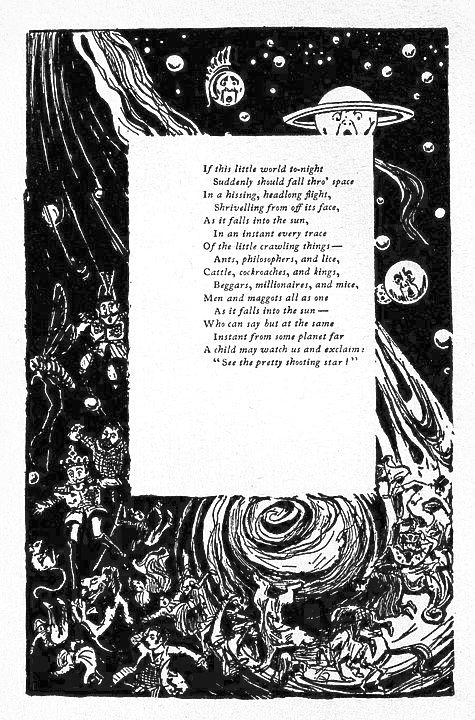
If this little world to-night
Suddenly should fall thro’ space
In a hissing, headlong flight,
Shrivelling from off its face,
As it falls into the sun,
In an instant every trace
Of the little crawling things—
Ants, philosophers, and lice,
Cattle, cockroaches, and kings,
Beggars, millionaires, and mice,
Men and maggots all as one
As it falls into the sun—
Who can say but at the same
Instant from some planet far
A child may watch us and exclaim:
“See the pretty shooting star!”
& Other FABLES
and VERSES by
OLIVER HERFORD
with many pictures
by the Author
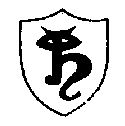
New York: Published by Charles Scribner’s Sons in the Autumn of MDCCCXCVIII
Copyright, 1898,
By Oliver Herford.
University Press:
John Wilson and Son, Cambridge, U.S.A.
TO THE ILLUSTRATOR
IN GRATEFUL ACKNOWLEDGMENT OF HIS AMIABLE CONDESCENSION IN LENDING HIS EXQUISITELY DELICATE ART TO THE EMBELLISHMENT OF THESE POOR VERSES FROM HIS SINCEREST ADMIRER
THE AUTHOR
| Page | |
| The Bashful Earthquake | 1 |
| The Lovesick Scarecrow | 7 |
| The Music of the Future | 9 |
| Song | 11 |
| The Doorless Wolf | 12 |
| The Bold Bad Butterfly | 15 |
| Crumbs | 20 |
| Japanesque | 21 |
| The Difference | 22 |
| Why ye Blossome Cometh before ye Leafe | 23 |
| The First First of April | 24 |
| The Epigrammatist | 26 |
| The Silver Lining | 28 |
| The Boastful Butterfly | 31 |
| The Three Wishes | 35 |
| Truth | 37 |
| The Tragic Mice | 38 |
| Absence of Mind | 40 |
| The Graduate | 41 |
| The Poet’s Proposal | 44 |
| A Three-sided Question | 45 |
| The Snail’s Dream | 51 |
| [Pg viii] A Christmas Legend | 52 |
| Hyde and Seeke | 54 |
| In the Café | 55 |
| The Legend of the Lily | 58 |
| The Untutored Giraffe | 60 |
| The Enchanted Wood | 64 |
| A Bunny Romance | 68 |
| The Flower Circus | 72 |
| The Fatuous Flower | 77 |
| A Love Story | 80 |
| Ye Knyghte-Mare | 83 |
| Metaphysics | 84 |
| The Princess that was n’t | 86 |
| The Lion’s Tour | 89 |
| The Fugitive Thought | 93 |
| The Cussed Damozel | 97 |
| A Gas-log Reverie | 101 |
| Cupid’s Fault | 103 |
| All Aboard | 104 |
| Killing Time | 105 |
| The Mermaid Club | 107 |
| A Song | 109 |
| Angel’s Toys | 110 |
| The Reformed Tigress | 112 |
| Two Ladies | 115 |
| To the Wolf at the Door | 119 |
| The Fall of J. W. Beane | 121 |
THE BASHFUL EARTHQUAKE
Crime, Wickedness, Villany, Vice,
And Sin only misery bring;
If you want to be Happy and Nice,
Be good and all that sort of thing.

The Earthquake rumbled
And mumbled
And grumbled;
And then he bumped,
And everything tumbled—
Bumpyty-thump!
Thumpyty-bump!—
Houses and palaces all in a lump!
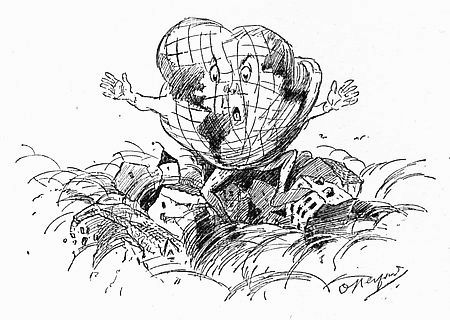
“Oh, what a crash!
Oh, what a smash!
How could I ever be so rash?”
The Earthquake cried.
“What under the sun
Have I gone and done?
I never before was so mortified!”
Then away he fled,
And groaned as he sped:
“This comes of not looking before I tread.”
Out of the city along the road
He staggered, as under a heavy load,
Growing more weary with every league,
Till almost ready to faint with fatigue.
He came at last to a country lane
Bordering upon a field of grain;
And just at the spot where he paused to rest,
In a clump of wheat, hung a Dormouse nest.
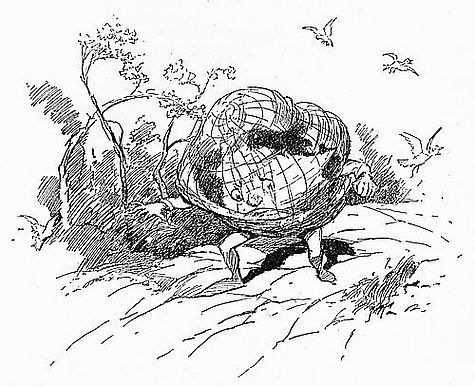
The sun in the west was sinking red,
And the Dormouse had just turned into bed,
[4]Dreaming as only a Dormouse can,
When all of a sudden his nest began
To quiver and shiver and tremble and shake.
Something was wrong, and no mistake!
In a minute the Dormouse was wide awake,
And, putting his head outside his nest,
Cried: “Who is it dares disturb my rest?”
His voice with rage was a husky squeak.
The Earthquake by now had become so weak
He’d scarcely strength enough to speak.

He even forgot the rules of grammar;
All he could do was to feebly stammer:
No one will know what he meant to say,
For all at once he melted away.
The Dormouse, grumbling, went back to bed,
“Oh, bother the Bats!” was all he said.
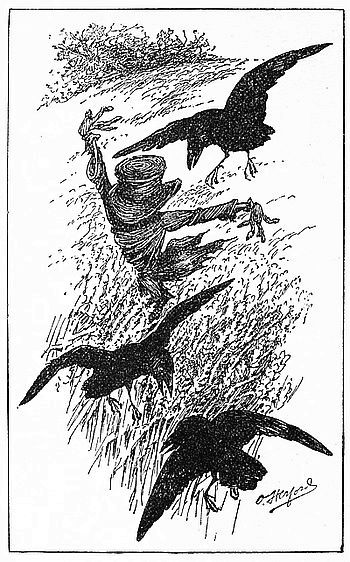

A scarecrow in a field of corn,
A thing of tatters all forlorn,
Once felt the influence of Spring
And fell in love—a foolish thing,
And most particularly so
In his case—for he loved a crow!
“Alack-a-day! it’s wrong, I know,
It’s wrong for me to love a crow;
An all-wise man created me
To scare the crows away,” cried he;
“And though the music of her ‘Caw’
Thrills through and through this heart of straw,
“My passion I must put away
And do my duty, come what may!
Yet oh, the cruelty of fate!
I fear she doth reciprocate
My love, for oft at dusk I hear
Her in my cornfield hovering near.
“And once I dreamt—oh, vision blest!
That she alighted on my breast.
’T is very, very hard, I know,
But all-wise man decreed it so.”
He cried and flung his arm in air,
The very picture of despair.
Poor Scarecrow, if he could but know!
Even now his lady-love, the Crow,
Sits in a branch, just out of sight,
With her good husband, waiting night,
To pluck from out his sleeping breast
His heart of straw to line her nest.
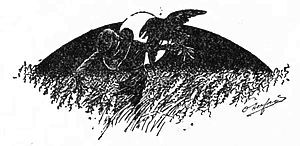

The politest musician that ever was seen
Was Montague Meyerbeer Mendelssohn Green.
So extremely polite he would take off his hat
Whenever he happened to meet with a cat.

“It’s not that I’m partial to cats,” he’d explain;
“Their music to me is unspeakable pain.
There’s nothing that causes my flesh so to crawl
As when they perform a G-flat caterwaul.
Yet I cannot help feeling—in spite of their din—
When I hear at a concert the first violin
Interpret some exquisite thing of my own,
If it were not for cat gut I’d never be known.

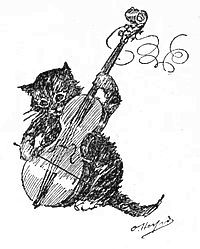
And so, when I bow as you see to a cat,
It is n’t to her that I take off my hat;
But to fugues and sonatas that possibly hide
Uncomposed in her—well—in her tuneful inside!”
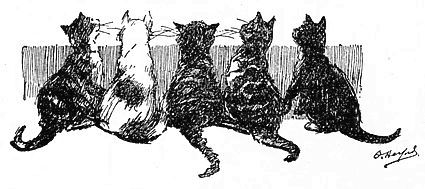
Gather Kittens while you may,
Time brings only Sorrow;
And the Kittens of To-day
Will be Old Cats To-morrow.
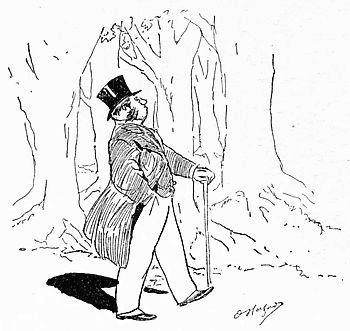
I saw, one day, when times were very good,
A newly rich man walking in a wood,
Who chanced to meet, all hungry, lean, and sore,
The wolf that used to sit outside his door.
Forlorn he was, and piteous his plaint.
“Help me!” he howled. “With hunger I am faint.
It is so long since I have seen a door—
And you are rich, and you have many score.
When you’d but one, I sat by it all day;
Now you have many, I am turned away.
Help me, good sir, once more to find a place.
Prosperity now stares me in the face.”
[13]The newly rich man, jingling all the while
The silver in his pocket, smiled a smile:
He saw a way the wolf could be of use.
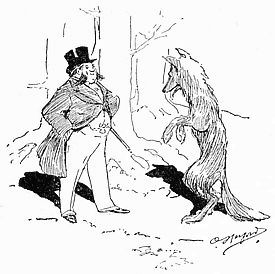
“Good wolf,” said he, “you’re going to the deuce,—
The dogs, I mean,—and that will never do;
I think I’ve found a way to see you through.
I too have worries. Ever since I met
Prosperity I have been sore beset
By begging letters, charities, and cranks,
All very short in gold and long in thanks.
Now, if you’ll come and sit by my front door
From eight o’clock each morning, say, till four,
[14]Then every one will think that I am poor,
And from their pesterings I’ll be secure.
Do you accept?” The wolf exclaimed, “I do!”
The rich man smiled; the wolf smiled; I smiled, too,
And in my little book made haste to scrawl:
“Thus affluence makes niggards of us all!”
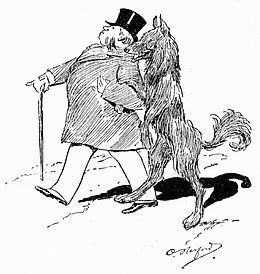
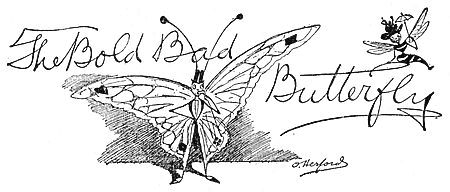
ne day a Poppy, just in play,
Said to a butterfly, “Go ’way,
Go ’way, you naughty thing! Oh, my!
But you’re a bold bad butterfly!”
Of course ’t was only said in fun,
He was a perfect paragon—
In every way a spotless thing
(Save for two spots upon his wing).
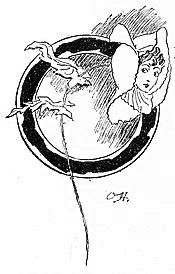
ne day a Poppy, just in play,
Said to a butterfly, “Go ’way,
Go ’way, you naughty thing! Oh, my!
But you’re a bold bad butterfly!”
Of course ’t was only said in fun,
He was a perfect paragon—
In every way a spotless thing
(Save for two spots upon his wing).
But tho’ his morals were the best,
He could not understand a jest;
And somehow what the Poppy said
Put ideas in his little head,
And soon he really came to wish
He were the least bit “devilish.”
He then affected manners rough
And strained his voice to make it gruff,
And scowled as who should say “Beware,
I am a dangerous character.
You’d best not fool with me, for I—
I am a bold, bad butterfly.”
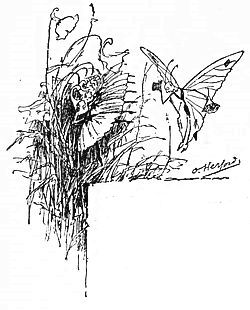
He then affected manners rough
And strained his voice to make it gruff,
And scowled as who should say “Beware,
I am a dangerous character.
You’d best not fool with me, for I—
I am a bold, bad butterfly.”
He hung around the wildest flowers,
And kept the most unseemly hours,
With dragonflies and drunken bees,
And learned to say “By Jove!” with ease
Until his pious friends, aghast,
Exclaimed, “He’s getting awf’lly fast!”
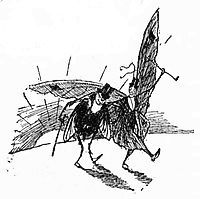
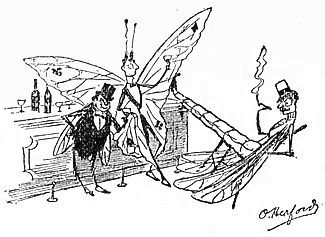
He shunned the nicer flowers, and threw
Out hints of shady things he knew
About the laurels, and one day
He even went so far to say
Something about the lilies sweet
I could not possibly repeat!
At length, it seems, from being told
How bad he was, he grew so bold,
This most obnoxious butterfly,
That one day, swaggering ’round the sky,
He swaggered in the net of Mist-
er Jones, the entomologist.
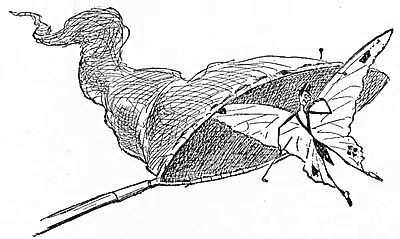
“It seems a sin,” said Mr. J.,
“This harmless little thing to slay,”
As, taking it from out his net,
He pinned it to a board, and set
Upon a card below the same,
In letters large, its Latin name,
Which is—
but I omit it, lest
Its family might be distressed,
And stop the little sum per year
They pay me not to print it here.
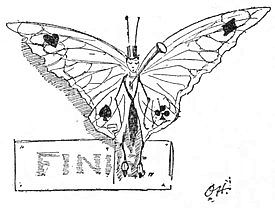
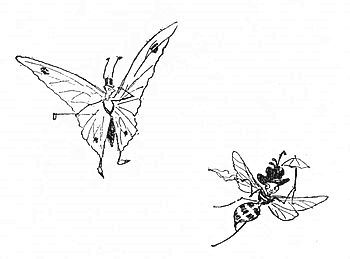
CRUMBS.
p to my frozen window-shelf
Each day a begging birdie comes,
And when I have a crust myself
The birdie always gets the crumbs.
They say who on the water throws
His bread, will get it back again;
If that is true, perhaps—who knows?—
I have not cast my crumbs in vain.
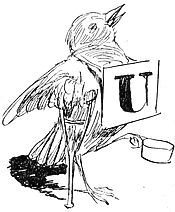
p to my frozen window-shelf
Each day a begging birdie comes,
And when I have a crust myself
The birdie always gets the crumbs.
They say who on the water throws
His bread, will get it back again;
If that is true, perhaps—who knows?—
I have not cast my crumbs in vain.
Indeed, I know it is not quite
The thing to boast of one’s good deed;
To what the left hand does, the right,
I am aware, should pay no heed.
Yet if in modest verse I tell
My tale, some editor, maybe,
May like it very much, and—well,
My bread will then return to me.
Oh, where the white quince blossom swings
I love to take my Japan ease!
I love the maid Anise who clings
So lightly on my Japan knees;
I love the little song she sings,
The little love-song Japanese.
I almost love the lute’s tink tunkle
Played by that charming Jap Anise—
For am I not her old Jap uncle?
And is she not my Japan niece?
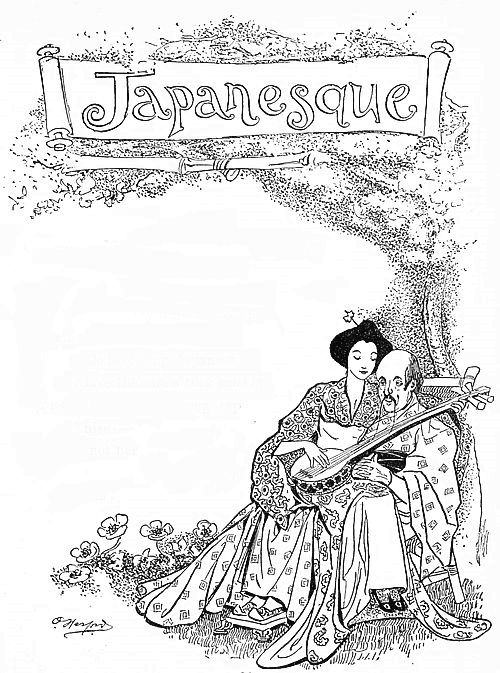
Oh, where the white quince blossom swings
I love to take my Japan ease!
I love the maid Anise who clings
So lightly on my Japan knees;
I love the little song she sings,
The little love-song Japanese.
I almost love the lute’s tink tunkle
Played by that charming Jap Anise—
For am I not her old Jap uncle?
And is she not my Japan niece?
n the spring the Leaves come out
And the little Poetlets sprout;
Everywhere they may be seen,
Each as Fresh as each is Green.
Each hangs on through scorch and scoff
Till the fall, when both “come off,”
With this difference, be it said,
That the leaves at least are Red.

n the spring the Leaves come out
And the little Poetlets sprout;
Everywhere they may be seen,
Each as Fresh as each is Green.
Each hangs on through scorch and scoff
Till the fall, when both “come off,”
With this difference, be it said,
That the leaves at least are Red.
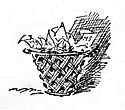
Once hoary Winter chanced—alas!
Alas! hys waye mistaking,
A leafless apple tree to pass
Where Spring lay dreaming. “Fie ye lass!
Ye lass had best be waking,”
Quoth he, and shook hys robe, and lo!
Lo! forth didde flye a cloud of snowe.
Now in ye bough an elfe there dwelte,
An elfe of wondrous powere,
That when ye chillye snowe didde pelte,
With magic charm each flake didde melte,
Didde melte into a flowere;
And Spring didde wake and marvelle how,
How blossomed so ye leafless bough.
The Infant Earth one April day
(The first of April—so they say),
When toddling on her usual round,
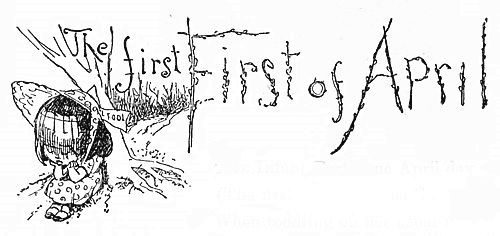
The Infant Earth one April day
(The first of April—so they say),
When toddling on her usual round,
Spied in her path upon the ground
A dainty little garland ring
Of violets—and that was Spring.
She caught the pretty wreath of Spring
And all the birds began to sing,
But when she thought to hold it tight
’T was rudely jerked from out her sight;
And while she looked for it in vain
The birds all flew away again.
Alas! The flowering wreath of Spring
Was fastened to a silken string,
And Time, the urchin, laughed for glee
(He held the other end you see).
[25]And that was long ago, they say,
When Time was young and Earth was gay.
Now Earth is old and Time is lame,
Yet still they play the same old game:
Old Earth still reaches out for Spring,
And Time—well—Time still holds the string.
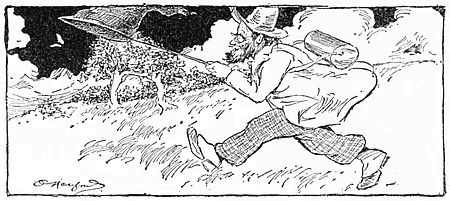
I know an entomologist
Who thinks it not a sin
To catch a harmless butterfly,
And stick it, with a pin,
Upon a piece of paper white,
And underneath the same,
In letters large and plain, to write
The creature’s Latin name.
I know another little man
Who catches, now and then,
A microscopic little thought
And goads it, with a pen,
To rhyme, until we wonder quite
How it can keep so tame,
And why he never fails to write
Beneath (in full) his name.
[27]If you should ask me to decide
The which of them I’d rate
The greater torment of the two
I should not hesitate.
It’s wicked with a pin to bore
A butterfly—but then,
I loathe the other fellow more,
Who bores me with his pen.
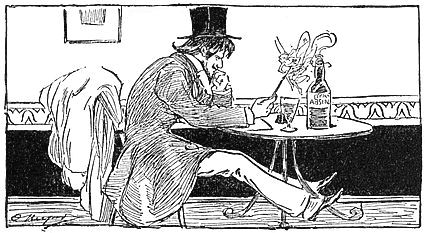
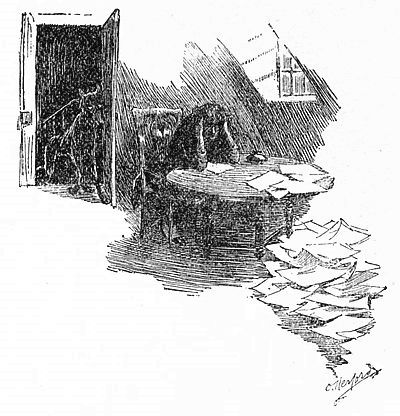
hen poets sing of lovers’ woes,
And blighted lives and throbs and throes
And yearnings—goodness only knows
It’s all a pose.
I am a poet too, you know,
I too was young once long ago,
And wrote such stuff myself, and so
I ought to know.
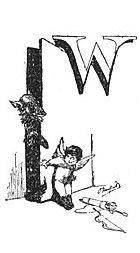
hen poets sing of lovers’ woes,
And blighted lives and throbs and throes
And yearnings—goodness only knows
It’s all a pose.
I am a poet too, you know,
I too was young once long ago,
And wrote such stuff myself, and so
I ought to know.
I too found refuge from Despair
In sonnets to Amanda’s fair
White brow or Nell’s complexion rare
Or Titian hair—
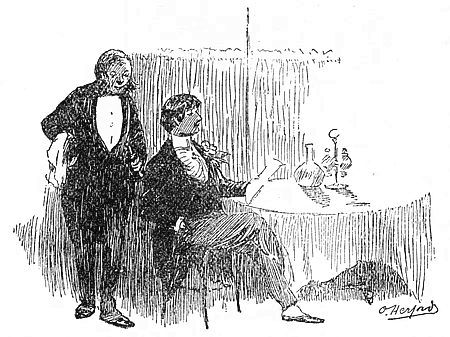
Which, when she scorned, did I resign
To flames, and go into decline?
Not much! When sonnets fetched per line
Enough to dine.
So, reader, when you read in print
A poet’s woe—beware and stint
Your tears—and take this gentle hint
It is his mint.
[30]When Julia’s “fair as flowery mead,”
Or when she “makes his heart-strings bleed,”
Know then she’s furnishing his feed
Or fragrant weed—
And even as you read—who knows?
Like cannibal that eats his foes,
He dines off Julia’s “heart that froze,”
Or “cheek of Rose.”
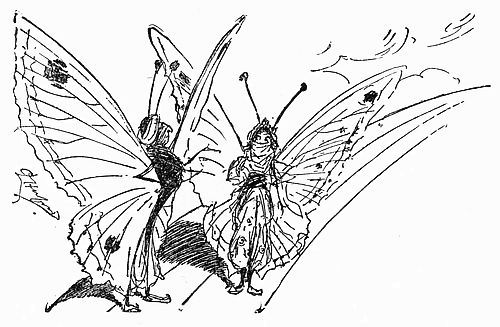
(FROM THE ORIENTAL.)
Upon the temple dome
Of Solomon the wise
There paused, returning home,
A pair of butterflies.
Enthusiasm she
Did not attempt to curb:
“Goodness gracious me!
Is n’t this superb!”
He vouchsafed a smile
To indulge her whimsy,
Surveyed the lofty pile,
And drawled, “Not bad—but flimsy!
“Appearances, though fine,
Lead to false deduction;
This temple, I opine,
Is shaky in construction.
“Think of it, my dear.
All this glittering show
Would crumble—disappear—
Should I but stamp my toe!
“If I should stamp—like this—”
His wife cried, “Heavens! don’t!”
He answered, with a kiss,
“Very well; I won’t.”

Now, every blessed word
Said by these butterflies,
It chanced, was overheard
By Solomon the wise.
He called in angry tone,
And bade a Djinn to hie
And summon to his throne
That boastful butterfly.
The butterfly flew down
Upon reluctant wing.
Cried Solomon, with a frown,
“How dared you say this thing?
“How dared you, fly, invent
Such blasphemy as this is?”
“Oh, king, I only meant
To terrify the missis.”
The insect was so scared
The king could scarce restrain
A smile. “Begone! you’re spared;
But don’t do it again!”

He called in angry tone,
And bade a Djinn to hie
And summon to his throne
That boastful butterfly.
The butterfly flew down
Upon reluctant wing.
Cried Solomon, with a frown,
“How dared you say this thing?
“How dared you, fly, invent
Such blasphemy as this is?”
“Oh, king, I only meant
To terrify the missis.”
The insect was so scared
The king could scarce restrain
A smile. “Begone! you’re spared;
But don’t do it again!”
So spake King Solomon.
The butterflew away.
His wife to meet him ran:
“Oh, dear, what did he say?”
The butterfly had here
A chance to shine, and knew it.
Said he: “The king, my dear,
Implored me not to do it!”

nce to a man a goblin came
And said to him, “If you will name
Three wishes, whatsoe’er they be,
They shall be granted instantly.
Think of three things you deem the best,
Express your wish—‘we do the rest.’”
“O Goblin!” cried the man, “indeed
You’re just the kind of a friend I need.
Hunger and Want I’ve known thus far,
I fain would learn what Riches are.”
“Then,” cried the Goblin, “learn it well,
Riches are title deeds to Hell!
Now wish again.”
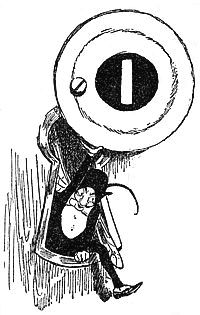
nce to a man a goblin came
And said to him, “If you will name
Three wishes, whatsoe’er they be,
They shall be granted instantly.
Think of three things you deem the best,
Express your wish—‘we do the rest.’”
“O Goblin!” cried the man, “indeed
You’re just the kind of a friend I need.
Hunger and Want I’ve known thus far,
I fain would learn what Riches are.”
“Then,” cried the Goblin, “learn it well,
Riches are title deeds to Hell!
Now wish again.”
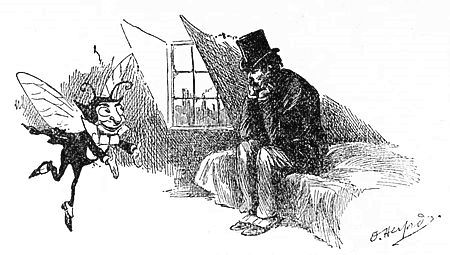
“Alackaday!”
Exclaimed the man. “I’ve thrown away,
And all for naught, a chance immense;
I only wish I had some sense!”
The Goblin waved his hand—the Dunce
To his surprise was wise for once.
And being wise, he laughed, and said:
“I am a fool—would I were dead!”
“Granted!” the Goblin yell’d “it’s plain
You’ll never be so wise again.”
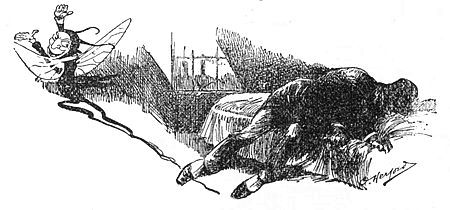
Permit me, madame, to declare
That I never will compare
Eyes of yours to Starlight cold,
Or your locks to Sunlight’s gold,
Or your lips, I’d have you know,
To the crimson Jacqueminot.
Stuff like that’s all very fine
When you get so much a line;
Since I don’t, I scorn to tell
Flattering lies. I like too well
Sun and Stars and Jacqueminot
To flatter them, I’d have you know.

It was a tragic little mouse
All bent on suicide
Because another little mouse
Refused to be his bride.
“Alas!” he squeaked, “I shall not wed!
My heart and paw she spurns;
I’ll hie me to the cat instead,
From whence no mouse returns!”
The playful cat met him half way,
Said she, “I feel for you,
You’re dying for a mouse, you say,
I’m dying for one, too!”
Now when Miss Mouse beheld his doom,
Struck with remorse, she cried,
“In death we’ll meet!—O cat! make room
For one more mouse inside.”
[39]The playful cat was charmed; said she,
“I shall be, in a sense,
Your pussy catafalque!” Ah me!
It was her last offence!
Reader, take warning from this tale,
And shun the punster’s trick:
Those mice, for fear lest cats might fail,
Had eaten arsenic!

They paused just at the crossing’s brink.
Said she, “We must turn back, I think.”
She eyes the mud. He sees her shrink,
Yet does not falter,
But recollects with fatal tact
That cloak upon his arm—in fact,
Resolves to do the courtly act
Of good Sir Walter.
Why is it that she makes no sound,
Staring aghast as on the ground
He lays the cloak with bow profound?
Her utterance chokes her.
She stands as petrified, until,
Her voice regained, in accents chill
She gasps, “I’ll thank you if you will
Pick up my cloak, sir!”
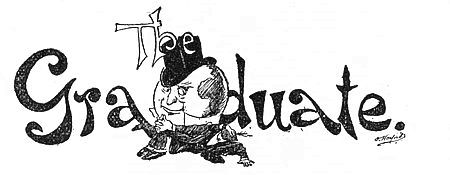
ou are old, ‘Father World,’” cried the Graduate,
“But for one of your age and size,
I feel it is only my duty to state
You are not uncommonly wise.”
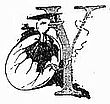
ou are old, ‘Father World,’” cried the Graduate,
“But for one of your age and size,
I feel it is only my duty to state
You are not uncommonly wise.”
“I am aged,” replied Father World, “it is true.
And not very wise I agree.
Do you think tho’ it’s fair for a scholar like you
To abuse an old fossil like me?”
Said the youth, “I refer not to college degrees,
Nor dates that one crams in his skull,
I complain not because you are lacking in these,
But because you’re so awfully dull!
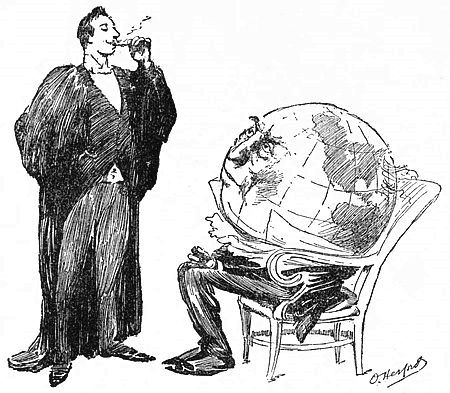
“I have studied you now I should think more or less
For twenty-one years, and I know
You right through and through, and I can but confess
You are really confoundedly slow.”
Said the world, “My dear sir, you are right, there’s no crime
Like dullness—henceforth I will try
To be clever—forgive me! I’m taking your time,
Perhaps we’ll meet later! Good-bye!”
[43]LATER.
“You are cold, Father World, and harden’d forsooth,”
Cried the man, “and exceeding wise,
And for any offensive remarks of my youth
I beg to apologize.”
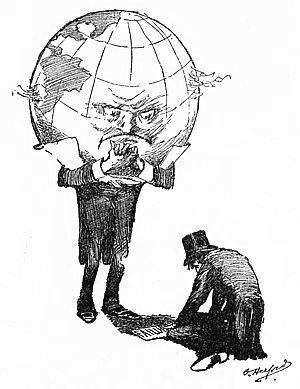
“Phyllis, if I could I’d paint you
As I see you sitting there,
You distracting little saint, you,
With your aureole of hair.
If I only were an artist,
And such glances could be caught,
You should have the very smartest
Picture frame that can be bought!
“Phyllis, since I can’t depict your
Charms, or give you aught but fame,
Will you be yourself the picture?
Will you let me be the frame?
Whose protecting clasp may bind you
Always—”
“Nay,” cried Phyllis; “hold,
Or you’ll force me to remind you
Paintings must be framed with gold!”
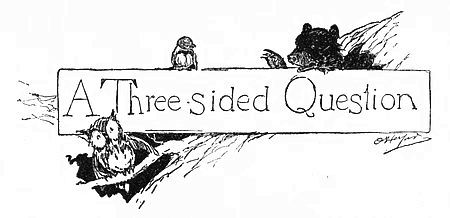
Scene. A hollow tree in the woods.
Time. December evening.
Mr. Owl.
Mr. Sparrow.
Mr. Bear.
Mr. Owl (stretching his wings):
eigho! It’s dark!
How fast the daylight goes!
I must have over-slept. It’s time I rose
And went about my breakfast to prepare.
I should keep better hours; I declare,
[46]Before I got to bed ’t was broad daylight!
That must be why I’m getting up to-night
With such a sleepy feeling in my head.
Heigho! Heigho! (Yawns.)
Mr. Owl (stretching his wings):
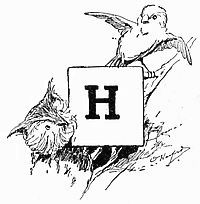
eigho! It’s dark!
How fast the daylight goes!
I must have over-slept. It’s time I rose
And went about my breakfast to prepare.
I should keep better hours; I declare,
Before I got to bed ’t was broad daylight!
That must be why I’m getting up to-night
With such a sleepy feeling in my head.
Heigho! Heigho! (Yawns.)
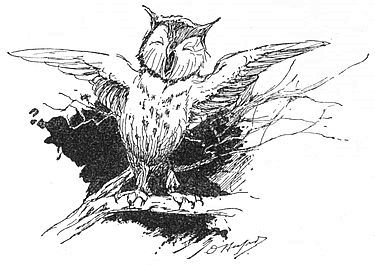
Enter Mr. Sparrow.
Mr. Sparrow: Why don’t you go to bed,
If you’re so very sleepy?—it’s high time!
The sun has set an hour ago, and I’m
Going home myself as fast as I can trot.
Night is the time for sleep.
Mr. Owl: The time for what?
The time for sleep, you say?
Mr. Sparrow: That’s what I said.
Mr. Sparrow (icily):
I do not catch your meaning quite, I fear.
Mr. Owl:
I mean you’re talking nonsense. Is that clear?
Mr. Sparrow (angrily):
Say that again—again, sir, if you dare!
Say it again!
Mr. Owl: As often as you care.
You’re talking nonsense—stuff and nonsense—there!
Mr. Sparrow (hopping one twig higher up):
You are a coward, sir, and impolite!
(Hopping on a still higher twig)
And if you were n’t beneath me I would fight.
Mr. Owl:
I am beneath you, true enough, my friend,
By just two branches. Will you not descend?
Or shall I—
Mr. Sparrow (hastily):
No, don’t rise. Tell me instead
What was the nonsense that you thought I said.
Mr. Owl:
It may be wrong, but if I heard aright,
You said the proper time for sleep was night.
Mr. Sparrow:
That’s what I said, and I repeat it too!
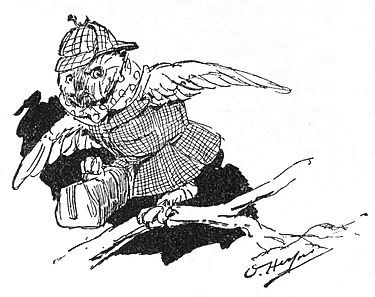
Mr. Owl:
Then you repeat a thing that is not true.
Day is the time for sleep, not night.
Mr. Sparrow:Absurd!
Who’s talking nonsense now?
Mr. Owl:Impudent bird!
How dare you answer back, you upstart fowl!
Mr. Sparrow: How dare you call me upstart—
you—you—Owl!
Mr. Owl:
This is too much! I’ll stand no more, I vow!
Defend yourself!
Mr. Bear (looking out of hollow tree):
Come, neighbors, stop that row!
What you’re about I’m sure I cannot think.
I only know I have n’t had one wink
Of sleep. Indeed, I’ve borne it long enough.
’T would put the mildest temper in a huff;
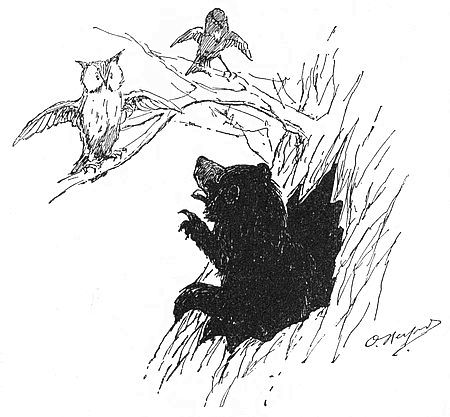
And I am but a bear. Why don’t you go
To bed like other folks, I’d like to know?
[50]Summer is long enough to keep awake—
Winter’s the time when honest people take
Their three months’ sleep.
Mr. Sparrow: That settles me! I fly!
Dear Mr. Owl and Mr. Bear, good-by! [Exit.
Mr. Owl:
I must go too, to find another wood.
Every one’s mad in this queer neighborhood!
It is not safe such company to keep.
Good evening, Mr. Bear. [Exit.
Mr. Bear: Now I shall sleep.
CURTAIN.

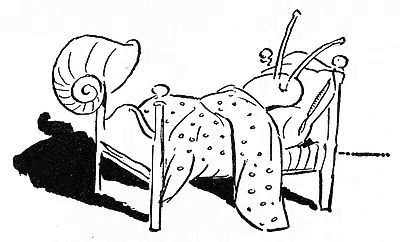
A snail, who had a way, it seems,
Of dreaming very curious dreams,
Once dreamed he was—you’ll never guess!—
The Lightning Limited Express!
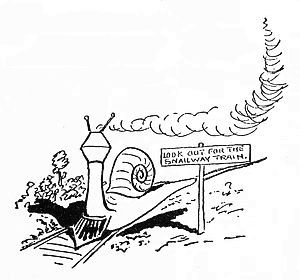
A snail, who had a way, it seems,
Of dreaming very curious dreams,
Once dreamed he was—you’ll
never guess!—
The Lightning Limited Express!
Beneathe an ancient oake one daye
A holye friar kneeled to praye;
Scarce hadde he mumbled Aves three,
When lo! a voice within the tree!
Straighte to the friar’s hearte it wente,
A voice as of some spirit pente
Within the hollow of the tree,
That cried, “Good father, sette me free!”
Quoth he, “This hath an evil sounde.”
Ande bente him lower to the grounde.
But ever tho’ he prayed, the more
The voice hys pytie didde implore,
Untyl he raised hys eyes ande there
Behelde a mayden ghostlie faire.
Thus to the holy manne she spoke:
“Within the hollow of this oak,
Enchanted for a hundred yeares,
Have I been bounde—yet vain my teares;
Notte anything can breake the banne
Till I be kiss’d by holye manne.”
[53]“Woe’s me!” thenne sayd the friar; “if thou
Be sente to tempt me breake my vowe;
Butte whether mayde or fiende thou be,
I’ll stake my soul to sette thee free.”
The holye manne then crossed hym thrice,
And kissed the mayde—when in a trice
She vanished—
“Heaven forgive me now!”
Exclaimed the friar—“my broken vowe.
“If I have sinned—I sinned to save
Another fromme a living grave.”
Thenne downe upon the earth he felle,
And prayed some sign that he might telle
If he were doomed for-evermore;
When lo! the oake, alle bare before,
Put forth a branch of palest greene,
And fruited everywhere betweene
With waxen berries, pearlie white,
A miracle before hys sight.
The holye friar wente hys waye
And told hys tale—
And from thatte daye
It hath been writ that anye manne
May blamelesse kiss what mayde he canne
Nor any one shall say hym “no”
Beneath the holye mistletoe.
One day beneathe a willowe tree,
Love met a mayde moste faire to see;
“Come play at hyde and seeke,” cried he.
“With alle my hearte!”—quoth she.
“I’m it!” Love cries, and rounde hys eyes
A scarfe the maiden bindeth,
And inne and oute and rounde aboute
Ye willowe trees he windeth—
Yette ne’er the maiden findeth.
Stille inne and oute and rounde aboute,
And stille no maiden meetinge;
Till, piqued, ye rogue unbinds hys eyes,
And, perched upon a branch, espies
Ye mayde retreatinge;
“Fie! Fie!” cries Love—“you’re cheetinge!”
“Now, you,” quothe he, “must seeke for me!”
She binds her eyes, assentinge,
And inne and oute and rounde aboute,
Seeks she for Love relentinge—
But Love, they say—alas, ye day!
Has spread his wings and flown away,
And left ye mayde lamentinge,
And left ye mayde repentinge.
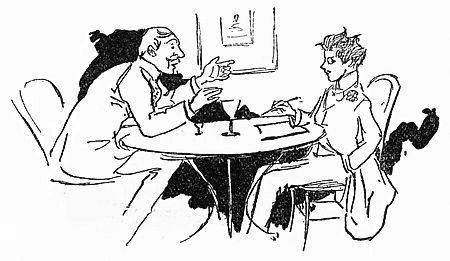
1 P. M.
He sits before me as I write,
And talks of this and that,
And all my thoughts are put to flight
By his infernal chat.
I came to write a tender rhyme
To Phyllis or to Mabel,
And chose in this retired café
The most secluded table.
He came before I’d time to fly,
And ere I could refuse,
[56]Had filled the very chair that I
Was keeping for the muse!
Then came the deluge—down it came
In one unceasing pour—
Of science, crops, photography,
Religion, soups, and war.
1.30—Forsooth the flood of words that flows
From this secluded table
Will soon be great enough to swamp
A dozen towers of Babel.
2.30—And still he stays, and still the flood
Is rising as before;
3— The world is now a sea of words
3.30— Without a sign of shore.
6— Great Scott! He’s going!
“No, must you go?
Don’t tear yourself away!
What have I written? Oh, some trash—
A sort of Fairy-lay,
Of how a dreadful ogre
Caught a luckless youth one day,
And drowned him in a flood of—well,
If you must go—good day!”
[57]ENVOY.
Phyllis—or Mabel! pray forgive—
I had to pay him out;
I’ll write that tender rhyme to you
Some other day, no doubt.
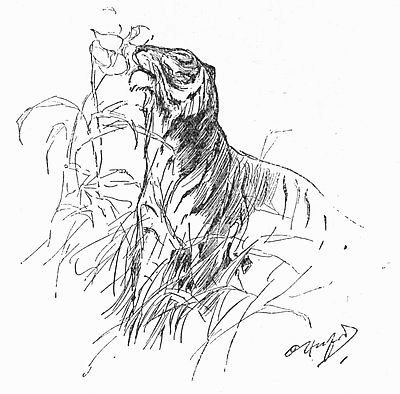
Once a Tiger for a freak,
Fell in love
With a Lily, pure and meek
And as timid, white, and weak
As a dove.
Yet withal a wee bit chilly,
Just enough the Tiger’s silly
Pride to pique.
[59]By and by the Lily cold,
Felt the charm;
Learned, tho’ dreadful to behold,
That the Tiger, fierce and bold,
Meant no harm.
And she smiled upon him shyly,
Till at length the Tiger wily
Was consoled.
So in time the Beauty grew
To adore
The Royal Beast who came to woo,
Loved him for his golden hue—
For his roar;
All for him with blushes burning,
To a Tiger-lily turning,
Golden too.
But alas, the luckless Lily
Loved in vain;
For a painted daffodilly
Came between them, and the Lily,
Pale with pain,
In a dark pool, drooped and pining,
Drowned herself, and rose a shining
Water-lily.
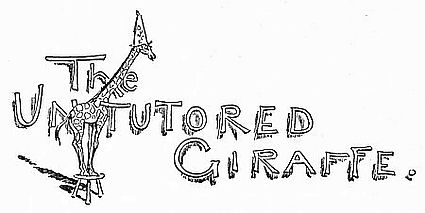
child at school who fails to pass
Examination in his class
Of Natural History will be
So shaky in Zoölogy,
That, should he ever chance to go
To foreign parts, he scarce will know
The common Mus Ridiculus
From Felis or Caniculus.
And what of boys and girls is true
Applies to other creatures, too,
As you will cheerfully admit
When once I’ve illustrated it.
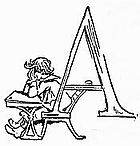
child at school who fails to pass
Examination in his class
Of Natural History will be
So shaky in Zoölogy,
That, should he ever chance to go
To foreign parts, he scarce will know
The common Mus Ridiculus
From Felis or Caniculus.
And what of boys and girls is true
Applies to other creatures, too,
As you will cheerfully admit
When once I’ve illustrated it.
Once on a time a young Giraffe
(Who when at school devoured the chaff,
And trampled underneath his feet
The golden grains of Learning’s wheat)
Upon his travels chanced to see
A Python hanging from a tree,
A thing he’d never met before.
All neck it seemed and nothing more;
And, stranger still, it was bestrown
With pretty spots much like his own.
“Well, well! I’ve often heard,” he said,
“Of foolish folk who lose their head;
But really it’s a funnier joke
To meet a head that’s lost its folk.
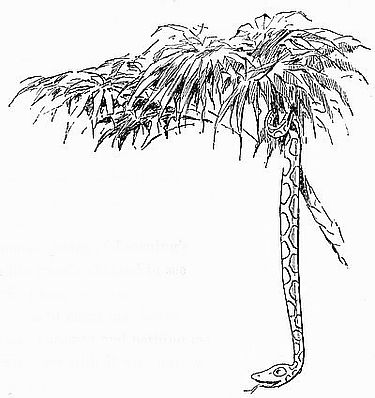
Once on a time a young Giraffe
(Who when at school devoured the chaff,
And trampled underneath his feet
The golden grains of Learning’s wheat)
Upon his travels chanced to see
A Python hanging from a tree,
A thing he’d never met before.
All neck it seemed and nothing more;
And, stranger still, it was bestrown
With pretty spots much like his own.
“Well, well! I’ve often heard,” he said,
“Of foolish folk who lose their head;
But really it’s a funnier joke
To meet a head that’s lost its folk.
“Dear me! Ha! ha! It makes me laugh.
Where has he left his other half?
If he could find it he would be
A really fine Giraffe, like me.”
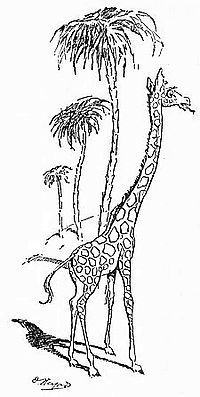
The Python, waking with a hiss,
Exclaimed, “What kind of snake is this?
Your spots are really very fine,
Almost as good in fact as mine,
But with those legs I fail to see
How you can coil about a tree.
Take away half, and you would make
A very decent sort of snake—
Almost as fine a snake as I;
Indeed, it’s not too late to try.”
A something in the Python’s eye
Told the Giraffe ’t was best to fly,
Omitting all formality.
And afterward, when safe at home,
He wrote a very learned tome,
Called, “What I Saw beyond the Foam.”
Said he, “The strangest thing one sees
Is a Giraffe who hangs from trees,
[63]And has—(right here the author begs
To state a fact) and has no legs!”
The book made a tremendous hit.
The public all devoured it,
Save one, who, minding how he missed
Devouring the author—hissed.

A dark old Raven lived in a tree,
With a little Tree-frog for company,
In the midst of a forest so thick with trees
Only thin people could walk with ease.
Yet though the forest was dank and dark,
The little Tree-frog was gay as a lark;
He piped and trilled the livelong day,
While the Raven was just the other way:
The moon was too pale, or the sun too bright;
The sky was too blue, or the snow too white;
The thrushes too gay, or the owls too glum;
And the squirrels—well, they were too squirrelsome.
And as for the trees, why did they grow
In a wood, of all places?—he’d like to know.
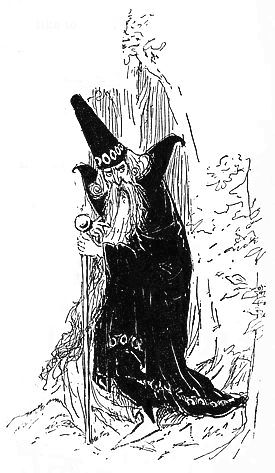
A wood is so dark and unhealthy, too,
For trees; and besides, they obstruct the view.
And so it went on from morn till night:
The Tree-frog piping with pure delight,
And the Raven croaking with all his might
That nothing in all the world was right.
Well, in this same wood, it chanced one day
The enchanter Merlin lost his way;
And stopping to rest ’neath the very tree
Where the Raven and Tree-frog were taking their tea,
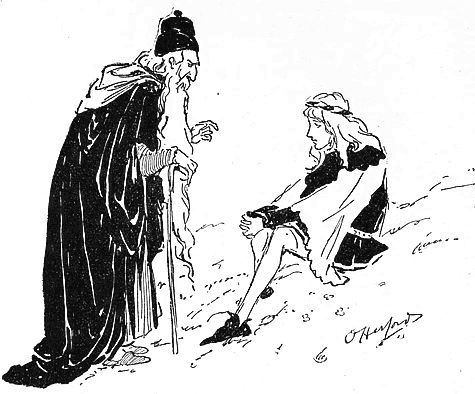
He divined of a sudden, by magic lore,
A thing I forgot to mention before:
That the forest and all that therein did dwell
Owed their present shape to an ancient spell.
Now a spell, though a tiresome job to make,
Is the easiest thing in the world to break,
He cried, “Let this forest and everything in it
Take its former shape!” When lo! in a minute,
In place of the Raven, a stern old sage
All robed in black and all bent with age;
And where the little Tree-frog had been
Sat a goodly youth all dressed in green;
And around about was a flowery lawn
Where the forest had been. Said the sage, with a yawn:
“I must have been dozing—well, to resume—
As I was saying, this world of gloom—”
“Oh, bother the world of gloom—just hear
That thrush!” cried the youth; “the first this year!”
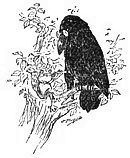
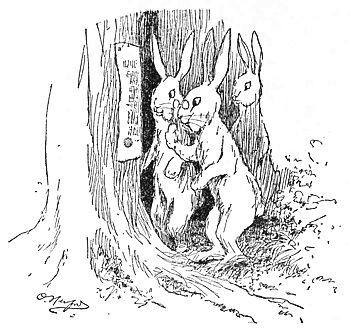
he Bunnies are a feeble folk
Whose weakness is their strength.
To shun a gun a Bun will run
To almost any length.
Now once, when war alarms were rife
In the ancestral wood
Where the kingdom of the Bunnies
For centuries had stood,
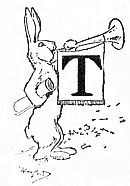
he Bunnies are a feeble folk
Whose weakness is their strength.
To shun a gun a Bun will run
To almost any length.
Now once, when war alarms were rife
In the ancestral wood
Where the kingdom of the Bunnies
For centuries had stood,
The king, for fear long peace had made
His subjects over-bold,
To wake the glorious spirit
Of timidity of old,
[69]Announced one day he would bestow
Princess Bunita’s hand
On the Bunny who should prove himself
Most timid in the land.
Next day a proclamation
Was posted in the wood
“To the Flower of Timidity,
The Pick of Bunnyhood:
His Majesty the Bunny king,
Commands you to appear
At a tournament—at such a date
In such and such a year—
Where his Majesty will then bestow
Princess Bunita’s hand
On the Bunny who will prove himself
Most timid in the land.”
Then every timid Bunny’s heart
Swelled with exultant fright
At the thought of doughty deeds of fear
And prodigies of flight.

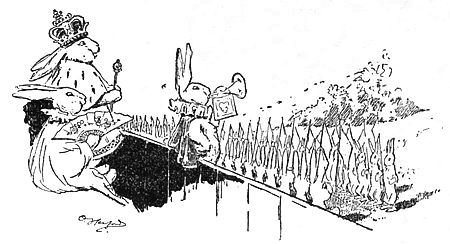
For the motto of the Bunnies
As perhaps you are aware,
Is “Only the faint-hearted
Are deserving of the fair.”
They fell at once to practising,
These Bunnies, one and all,
Till some could almost die of fright
To hear a petal fall.
And one enterprising Bunny
Got up a special class
To teach the art of fainting
At your shadow on the grass.
At length—at length—at length
The moment is at hand!
And trembling all from head to foot
A hundred Bunnies stand.
And a hundred Bunny mothers
With anxiety turn gray
Lest their offspring dear should lose their fear
And linger in the fray.
[71]Never before in Bunny lore
Was such a stirring sight
As when the bugle sounded
To begin the glorious flight!
A hundred Bunnies, like a flash,
All disappeared from sight
Like arrows from a hundred bows—
None swerved to left or right.
Some north, some south, some east, some west,—
And none of them, ’t is plain,
Till he has gone around the earth
Will e’er be seen again.
It may be in a hundred weeks,
Perchance a hundred years.
Whenever it may be, ’t is plain
The one who first appears
Is the one who ran the fastest;
He wins the Princess’ hand,
And gains the glorious title of
“Most Timid in the Land.”
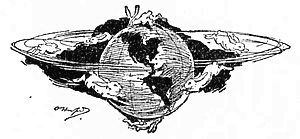
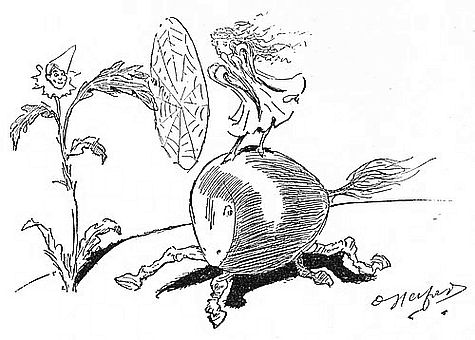
The flowers in the dell
Once gave a circus show;
And as I know them well,
They asked if I would go
As their especial guest.
“Quite charmed!” said I, and so
Put on my very best
Frock-coat and shiny hat,
[73]And my embroidered vest
And wonderful cravat;
In fact, no end of style,
For it is, as you know,
But once in a great while
The flowers give a show.
They gave me a front seat,
The very nicest there—
A bank of violets sweet
And moss and maidenhair.
’T was going to be a treat—
I felt it in the air.
As martial music crashed
From a trained trumpet-vine,
Into the ring there dashed
A beauteous columbine!
With airy grace she strode
Her wild horse-chestnut steed.
I held my breath, she rode
With such terrific speed.
They brought a cobweb ring,
And lightly she jumped through it.
(A very dangerous thing;
How did she learn to do it?)
[74]I cried, “Brava! Encore!”
Until she’d jumped through nine,
Each higher than before.
(I tell you, it was fine!)
Then Jack-in-pulpit—who
From out his lofty place
Announced what each would do—
Cried, “Next there comes a race.”
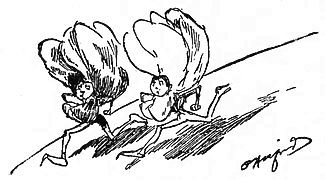
Two Scarlet Runners flew
Three times the ring around,
And with a crown of dew
The winner’s head was crowned.
A booby race, for fun,
Came next (the prize was cheaper).
Trailing Arbutus won
Over Virginia Creeper.
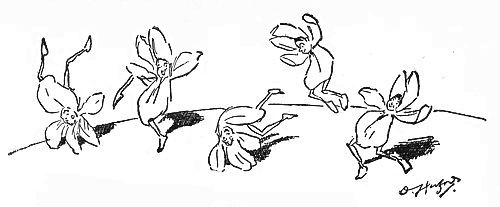
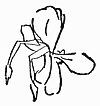
Then came the world-famed six,
The Johnny-jump-up Brothers,
Who did amazing tricks,
Each funnier than the others.
A Spider, in mid-air
(Engaged at great expense),
On tight-thread gossamer
Danced with a skill immense!
A dashing young Green Blade
Who quickly followed suit,
An exhibition made
Of how young blades can shoot.
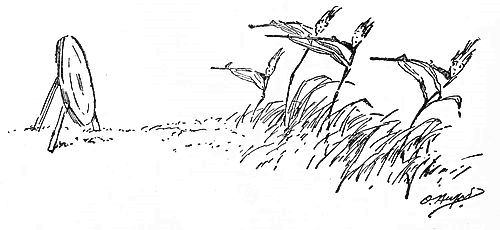
There were Harebell ringers, too,
Who played delightful tunes,
And trained Dog-violets, who
Did antics, like buffoons.
All these and more were there—
Too many for narration;
But nothing could compare
With the last “Great Sensation.”
I never shall forget,
Though I should live an age,
The sight of Mignonette
Within the Lion’s cage.
Sweet smiling Mignonette!
Not one bit scared—for why on
Earth should she fear her pet,
Her dear, tame Dandelion?
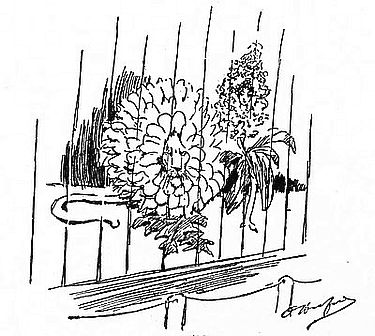
nce on a time a Bumblebee
Addressed a Sunflower. Said he:
“Dear Sunflower, tell me is it true
What everybody says of you?”
Replied the Sunflower: “Tell me, pray,
How should I know what people say?
Why should I even care? No doubt
’T is some ill-natured tale without
A word of truth; but tell me, Bee,
What is it people say of me?”
“Oh, no!” the Bee made haste to add;
“’T is really not so very bad.
I got it from the Ant. She said
She’d heard the Sun had turned your head,
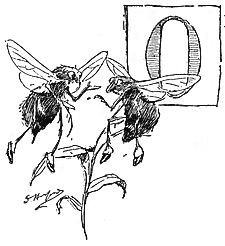
nce on a time a Bumblebee
Addressed a Sunflower. Said he:
“Dear Sunflower, tell me is it true
What everybody says of you?”
Replied the Sunflower: “Tell me, pray,
How should I know what people say?
Why should I even care? No doubt
’T is some ill-natured tale without
A word of truth; but tell me, Bee,
What is it people say of me?”
“Oh, no!” the Bee made haste to add;
“’T is really not so very bad.
I got it from the Ant. She said
She’d heard the Sun had turned your head,
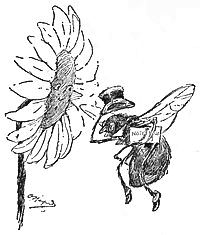
And that whene’er he walks the skies
You follow him with all your eyes
From morn till eve—”
“Oh, what a shame!”
Exclaimed the Sunflower, aflame,
“To say such things of me! They know
The very opposite is so.
“They know full well that it is he—
The Sun—who always follows me.
I turn away my head until
I fear my stalk will break; and still
He tags along from morn till night,
Starting as soon as it is light,
And never takes his eyes off me
Until it is too dark to see!
They really ought to be ashamed.
Soon they’ll be saying I was named
For him, when well they know ’t was he
Who took the name of Sun from me.”
[79]The Sunflower paused, with anger dumb.
The Bee said naught, but murmured, “H’m!”
’T was very evident that he
Was much impressed—this Bumblebee.
He spread his wings at once and flew
To tell some other bees he knew,
Who, being also much impressed,
Said, “H’m!” and flew to tell the rest.
And now if you should chance to see,
In field or grove, a Bumblebee,
And hear him murmur, “H’m!” then you
Will know what he’s alluding to.
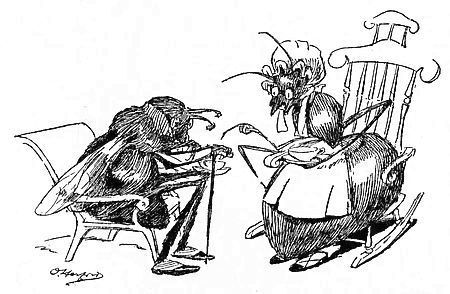
A LOVE STORY.
He was a Wizard’s son,
She an Enchanter’s daughter;
He dabbled in Spells for fun,
Her father some magic had taught her.
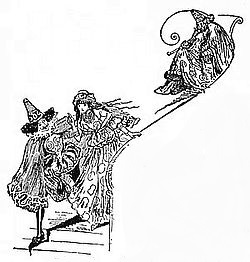
He was a Wizard’s son,
She an Enchanter’s daughter;
He dabbled in Spells for fun,
Her father some magic had taught her.
They loved—but alas! to agree
Their parents they could n’t persuade.
An Enchanter and Wizard, you see,
Were natural rivals in trade—
And the market for magic was poor—
There was scarce enough business for two
So what started rivalry pure
Into hatred and jealousy grew.
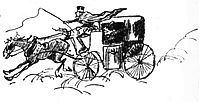
Now the lovers were dreadfully good;
But when there was really no hope,
After waiting as long as they could,
What else could they do but elope?
They eloped in a hired coupé;
And the youth, with what magic he knew—
Made it go fully five miles a day.
(Such wonders can sorcery do!)
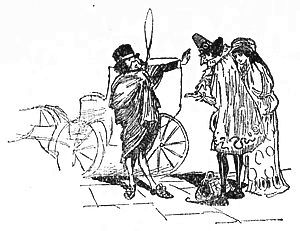
Then the maiden her witcheries plied,
And enchanted the cabman so much,
When they got to the end of their ride
Not a cent of his fare would he touch!
Now they’re married and live to this day
In a nice little tower, alone,
For the building of which, by the way,
Their parents provided the stone.
Then the parents relented? Oh, no!
They pursued with the fury of brutes,
But arrived just too late for the show,
Through a leak in their seven-league boots;
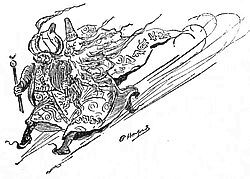
And finding their children were wed,
Into such a wild rage they were thrown,
They rushed on each other instead
And each turned the other to stone.
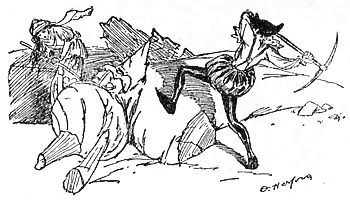
Then the lovers, since lumber was high,
And bricks were as then quite unknown,
As soon as their tears were quite dry—
They quarried their parents for stone.
And now in a nice little tower,
In Blissfulness tinged with Remorse,
They live like as not to this hour—
(Unless they have got a divorce).
MORAL.
Crime, Wickedness, Villany, Vice,
And Sin only misery bring;
If you want to be Happy and Nice,
Be good and all that sort of thing.
A POST-MORT-D’ARTHURIAN LEGEND.
Ye log burns low, ye feaste is donne,
Twelve knyghtes of ye Table Rounde
Slyde down fromme ye benches, one by one,
And snore upon ye ground.
Ye log to a dimme blue flame has died,
When ye doore of ye banquet halle
Is opened wide, and in there glyde
Twelve spectral Hagges ande Talle.
Ye log burns dimme, and eke more dimme,
Loud groans each knyghtlie gueste,
As ye ghoste of his grandmother, gaunt and grimme,
Sitts on each knyghte hys cheste.
Ye log in pieces twaine doth falle,
Ye daye beginnes to breake,
Twelve ghostlie grandmothers glyde from ye hall,
And ye twelve goode knyghtes awake.
Ande ever whenne Mynce Pye was placed
On ye table frome thatte daye,
Ye Twelve knyghtes crossed themselves in haste
Ande looked ye other waye.
Why and Wherefore set one day
To hunt for a wild Negation.
They agreed to meet at a cool retreat
On the Point of Interrogation.
But the night was dark and they missed their mark,
And, driven well-nigh to distraction,
They lost their ways in a murky maze
Of utter abstruse abstraction.
Then they took a boat and were soon afloat
On a sea of Speculation,
But the sea grew rough, and their boat, though tough,
Was split into an Equation.
[85]As they floundered about in the waves of doubt
Rose a fearful Hypothesis,
Who gibbered with glee as they sank in the sea,
And the last they saw was this:
On a rock-bound reef of Unbelief
There sat the wild Negation;
Then they sank once more and were washed ashore
At the Point of Interrogation.
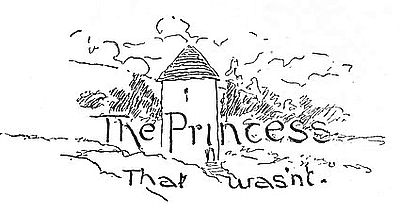
In a very lonely tower,
So the legend goes to tell,
Pines a Princess in the power
Of a dreadful Dragon’s spell.
There she sits in silent state,
Always watching—always dumb,
While the Dragon at the gate
Eats her suitors as they come—
King and Prince of every nation
Poet, Page, and Troubadour,
Of whatever rank or station—
Eats them up and waits for more.
[87]Every Knight that hears the legend
Thinks he’ll see what he can do,
Gives his sword a lovely edge, and—
Like the rest is eaten too!
All of which is very pretty,
And romantic, too, forsooth;
But, somehow, it seems a pity
That they should n’t know the truth.
If they only knew that really
There is no Princess to gain—
That she’s an invention merely
Of the crafty Dragon’s brain.
Once it chanced he’d missed his dinner
For perhaps a day or two;
Felt that he was getting thinner,
Wondered what he’d better do.
Then it was that he bethought him
How in this romantic age
(Reading fairy tales had taught him)
Rescuing ladies was the rage.
So a lonely tower he rented,
For a trifling sum per year,
And this thrilling tale invented,
Which was carried far and near;
[88]Far and near throughout the nations,
And the Dragon ever since,
Has relied for daily rations,
On some jolly Knight or Prince.
And while his romantic fiction
To a chivalrous age appeals,
It’s a very safe prediction:
He will never want for meals.
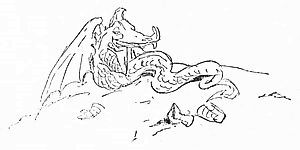
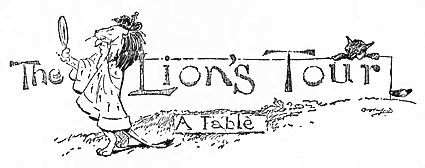
A Fable
is Majesty the King of Beasts,
Tired of fuss and formal feasts,
Once resolved that he would go
On a tour incognito.
But a suitable disguise
Was not easy to devise;
Kingly natures do not care
Other people’s things to wear.
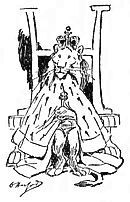
is Majesty the King of Beasts,
Tired of fuss and formal feasts,
Once resolved that he would go
On a tour incognito.
But a suitable disguise
Was not easy to devise;
Kingly natures do not care
Other people’s things to wear.
The very thought filled him with shame.
“No, I will simply change my name,”
Said he, “and go just as I am,
And call myself a Woolly Lamb.”
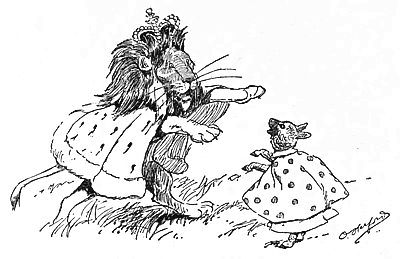
And so he did, and as you’ll guess,
He had a measure of success.
Disguised in name alone, he yet
Took in ’most every one he met.
The first was Mister Wolf, who said,
“Your Majesty—” “Off with his head!”
The angry monarch roared. “I am,
I’d have you know, a Woolly Lamb.”
Then Mistress Lamb, who, being near,
Had heard, addressed him: “Brother dear—”
“Odds cats!” the lion roared. “My word!
Such insolence I never heard!”
[91]His rage was a terrific sight
(It almost spoiled his appetite).
And so it went, until one day
He met Sir Fox, who stopped to say
(Keeping just far enough away,
Yet in a casual, off-hand way,
As if he did n’t care a fig),
“Good-morning to you, Thingumjig.”
To-day we think it infra dig,
To use such words as Thing um jig;
But what is now a vulgar word
In those days never had been heard.
Sir Fox himself invented it
This great emergency to fit.
The King of Beasts, quite unprepared
For this reception, simply stared.
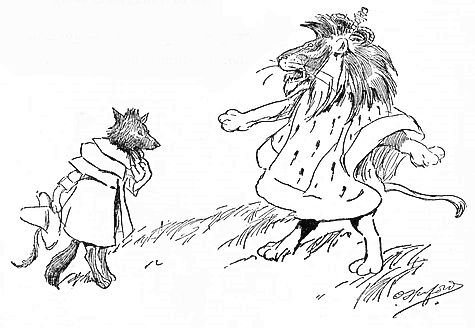
The King of Beasts, quite unprepared
For this reception, simply stared.
Of course he was not going to show
There was a word he did not know.
He bowed, and with his haughtiest air
Resumed his walk; but everywhere
He went his subjects, small and big,
Took up the cry of Thingumjig.
It followed him where’er he went;
He did n’t dare his rage to vent.
Suppose it were a compliment?
His anger then would only show
Here was a word he did not know!
The only course for him ’t was clear,
Was to pretend he did not hear.
And this he did until, at length,
Long fasting so impaired his strength
He gave his tour up in despair,
Mid great rejoicing everywhere.
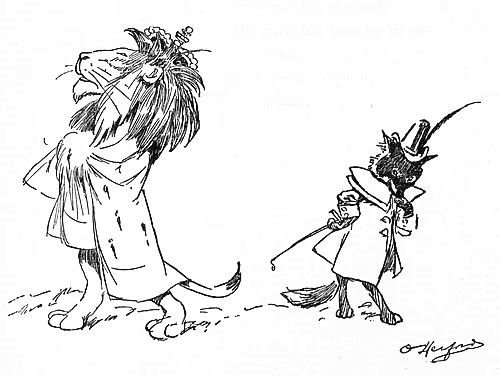
And this he did until, at length,
Long fasting so impaired his strength
He gave his tour up in despair,
Mid great rejoicing everywhere.
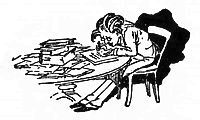
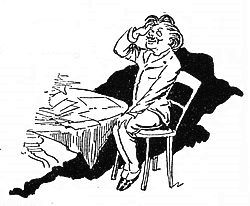
When scribbling late one night
I happened to alight
On the happiest thought I’d thought
For many a year.
I hailed it with delight
But ere I’d time to write
My pencil had contrived
To disappear.
Where could the thing have gone?
I searched and searched upon
The table, and beneath it
And behind it.
I pushed my books about,
Turned my pockets inside out,
But the more I looked
The more I could n’t find it!
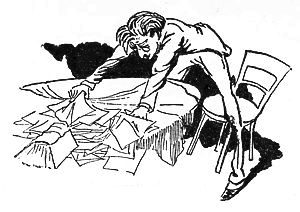
Then I searched and searched again
On the table, but in vain,
And I fussed and fumed
And felt about the floor.
And I rose up in my wroth,
And I shook the tablecloth,
And turned my pockets
Inside out once more!
“This will not do,” I said,
“I must not lose my head!”
So I went and tore the cushions
From my chair,
Shook all my rugs and mats,
And shoes and coats and hats,
And crawled beneath the
Sofa in despair!
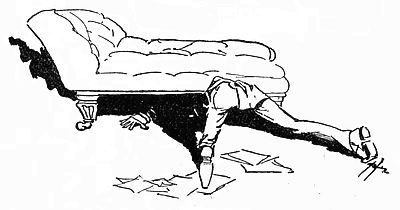

Then I said, “I must keep cool!”
So I took my two-foot rule
And I poked among the
Ashes in the grate.
And I paced my room in rage,
Like a wild beast in a cage,
In a furious, frightful, frantic,
Frenzied state!
At last, upon my soul,
I lost my self-control
And indulged in language
Quite unfit to hear;
Till out of breath—I gasped
And clutched my head—and grasped
That pencil calmly resting on
My ear!
[96]Yes, I found that pencil stub!
But my thought—Aye, there’s the rub
In vain I try to call it
Back again.
It has fled beyond recall,
And what is worst of all
’T will turn up in some
Other fellow’s brain!
So I denounce forthwith
Any future Jones or Smith
Who thinks my thought—a
Plagiarist of the worst.
I shall know my thought again
When I hear it, and it’s plain
It must be mine because
I thought it first!
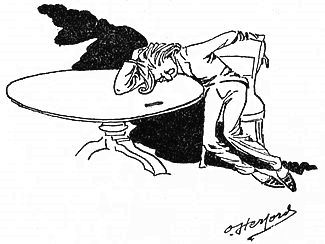
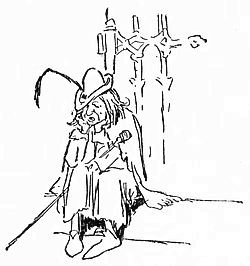
A lover sate alone
All by the Golden Gate,
And made exceedynge moan
Whiles he hys Love didde wait.
To him One coming prayed
Why he didde weepe. Said he,
“I weepe me for a maid
Who cometh notte to mee.”
[98]“Alas! I waite likewise
My Love these many years;
Meseems ’t would save our eyes
If we should pool our tears.”
And so they weeped full sore
A twelvemonth and a daye,
Till they could weepe no more,
For notte a tear hadde they.
Whenas they came to see
They could not weepe alway,
Each of hys Faire Ladyee
’Gan sing a rondelay.
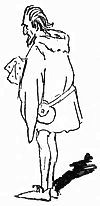
“My Love hath golden hair,”
Sang one, “and like the wine
The red lips of my Fair.”
The other sang, “So’s mine.”
“My Love is wondrous wise,”
Sang one, “and wondrous fine
And wondrous dark her eyes.”
The other sang, “So’s mine.”
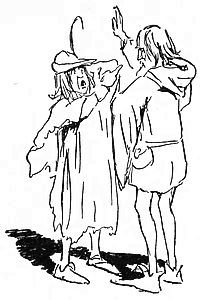
“My Love is wondrous proud,
And her name is Geraldyne.”
“Thou liest!” shrieked aloud
The other. “She is mine!”
“She plighted ere I died
Eternal troth to me.”
“Good lack,” the other cried,
“E’en so she plighted me!”
The twain didde then agree,
In their most grievous plight,
To fly to earth and see
The which of them was right.
Alack and well-a-daye!
A-well-a-daye alack!
Eft soons they flew away,
Eft sooners flew they back.
For when they had come there
They were not fain to stay,
To Geraldyne the Faire
Her silver weddyng daye.
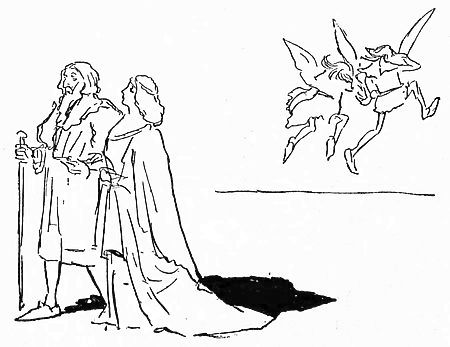

As I sit, inanely staring
In the Gas-log’s lambent flame,
Far away my fancy’s faring
To a land without a name,—
To the country of Invention,
Where I roam in ecstasy,
Where all things are mere pretension,
Nothing what it seems to be.
Folded in a calm serenic,
On a jute-bank I recline,
Where, mid moss of hue arsenic,
Millinery flowers entwine.
Cambric blooms—glass-dew beshowered,
Gay with colors aniline,
Ever eagerly devoured
By the mild, condensed milch kine.
[102]Now the scene idyllic changes
From the meadows aniline,
And my faltering fancy ranges
Down a dismal, deep decline,
Scene of some age past upheaval,
Where no foot of man has fared,
To a Gas-log grove primeval,
Where I find me, mute, and scared
Of—I know not—Goblins, Banshees,
And the ancient Gas-trees toss
Gnarled and flickering giant branches,
Hoary with asbestos moss.
Now I come to where are waving
Painted palms, precisely planned,
Rearing trunks of cocoa shaving,
By electric zephyrs fanned,
Soothing me with sound seraphic
Till I sink into a swoon,
Dreaming cineomatographic
Dreams beneath an arc-light moon.

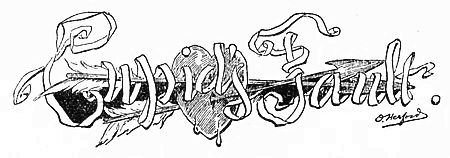
Once Cupid, he
Went on a spree
And made a peck of trouble,
“Ah ha!” cried he,
“Two hearts I see!”
Alack, the rogue saw double.
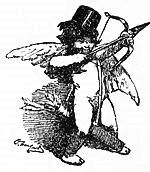
There was but one;
What has he done?
How could he be so stupid?
Into one heart
Two arrows dart—
O Cupid, Cupid, Cupid!
In truth ’t is sweet
When “two hearts beat
As one”—but what to do
When in one heart
Two arrows smart
And one heart beats as two?
Scene: a railway station.
ust two minutes more!
O Tempus, stand still,
Stand still, I implore,
One moment, until
I have time to reflect
On what I would say.
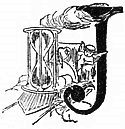
ust two minutes more!
O Tempus, stand still,
Stand still, I implore,
One moment, until
I have time to reflect
On what I would say.
Give me time to collect
My senses, I pray,
Until I have said
What my courage was mounting
To say, when instead
I was stupidly counting
The moments that fled!
O Tempus! you’re flying!
A plague on this parting,
This sighing, goodbying,
This smiling and smarting;
A plague too upon
This—Heavens! it’s starting!
Good bye!—
There, she’s gone!
The air was full of shouts and cries,
Of shrill “Ha-ha’s,” and “Ho’s,” and “Hi’s,”
And every kind of whistle,
And the sky was dark with flying things—
Golf-sticks, balls, engagement-rings,
Novels, rackets, and billiard-cues,
Cameras, fishing-rods, and shoes,
And every sort of missile.
The ground was black with a seething mass
Of people of every kind and class—
Matrons, men, and misses,
Ladies and gentlemen, old and new,
Lads and lasses, and children too,
Elderly men with elderly wives—
Hustling and bustling for their lives.
“I wonder what all this is?”
Said I: “I fear that it may be
Another case for the S. P. C.
[106]’T will bear investigation.”
I dropped my book and joined the race,
And struggling into the foremost place,
Behold, the object of the chase
Was an aged man with wrinkled face!
I was filled with indignation.
His frame was bent and his knees aknock,
His head was bald but for one lock,
And I cried with anger thrilling,
“This thing must stop; ’t is a disgrace
An aged gentleman to chase.”
Then everybody laughed in my face.
“This,” they cried, “is a different case;
It’s only ‘Time’ we’re killing.”
Then it was I observed two things
That grew from his shoulders—two big wings!
And I joined in the people’s laughter.
Tho’ killing is often out of place,
A circumstance may alter a case.
So I took my pad and pencil-case,
And for want of a missile, in its place
I tossed these verses after.

The Mermaid Culture Club request
That you will kindly be
On such and such a day their guest
At something after three.
I wrote at once that “I should be
Most charmed,” and donn’d my best
Dress diving-suit,—a joy to see,—
And at their club-house ’neath the sea
Arrived at “something after three”
Promptly (unpunctuality
Is something I detest).
The President, a mermaid fair,
Sat by a coral table,
And read an essay with an air
Intelligent and able
Upon—but you will never guess
The subject—it was nothing less
Than sunshades and umbrellas.
I really did my very best
To keep from laughing—as their guest.
[108]That it was hard must be confessed
When next the meeting was addressed
On shoes, and which would wear the best—
Tan slippers or prunellas.
Then came (it did look like a joke)
Essays on bonnet, hat, and toque:
Said I, “They must be mocking.”
And when at length a mermaid rose,
And read a thesis to expose
The latest novelty in hose,
I felt my reason rocking.
But when at last the thing was o’er,
And I was back again on shore,
I fell to moralizing.
And as remembrance came to me
Of other clubs not in the sea,
Of essays read by ladies fair
Upon the “why” and “whence” and “where,”
Said I, “It’s not surprising.”
Then came (it did look like a joke)
Essays on bonnet, hat, and toque:
Said I, “They must be mocking.”
And when at length a mermaid rose,
And read a thesis to expose
The latest novelty in hose,
I felt my reason rocking.
But when at last the thing was o’er,
And I was back again on shore,
I fell to moralizing.
And as remembrance came to me
Of other clubs not in the sea,
Of essays read by ladies fair
Upon the “why” and “whence” and “where,”
Said I, “It’s not surprising.”
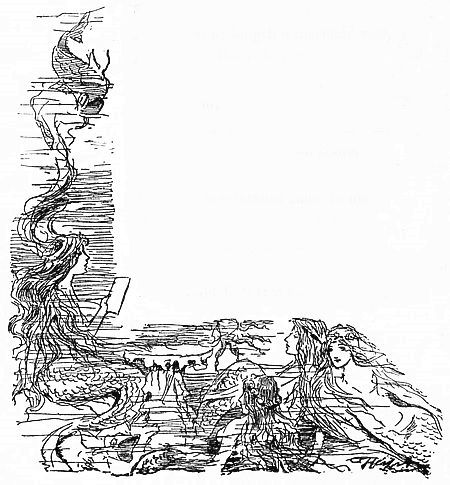
pon a time I had a Heart,
And it was bright and gay;
And I gave it to a Lady fair
To have and keep alway.
She soothed it and she smoothed it
And she stabbed it till it bled;
She brightened it and lightened it
And she weighed it down with lead.
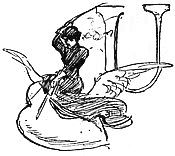
pon a time I had a Heart,
And it was bright and gay;
And I gave it to a Lady fair
To have and keep alway.
She soothed it and she smoothed it
And she stabbed it till it bled;
She brightened it and lightened it
And she weighed it down with lead.
She flattered it and battered it
And she filled it full of gall;
Yet had I Twenty Hundred Hearts,
Still should she have them all.
ANGEL’S TOYS.
I’ve often wondered—have n’t you?—
What all the little angels do
To while eternity away,
When grown-up angels sing and play
Upon their harps with golden strings,
And lutes and violas and things.
What do they do? What do they play
To while eternity away?
After much pondering profound,
Perhaps an answer I have found—
I give it you for what it’s worth.
The people now upon this earth,
Who neither quite deserve to go
Above hereafter, nor below—
The prig, the poser, and the crank;
The snob, who thinks of naught but rank;
The gossip and the fool—in short,
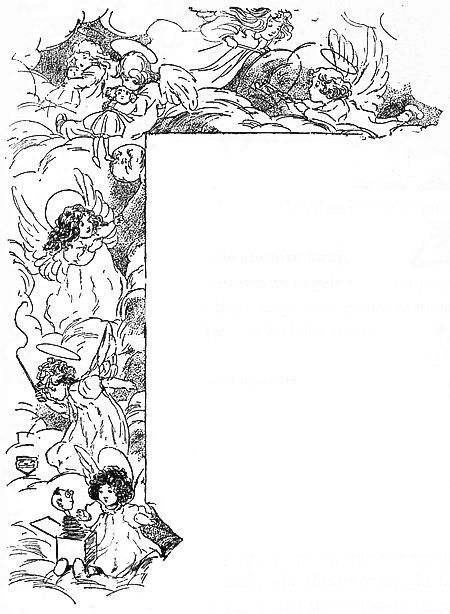
I’ve often wondered—have n’t you?—
What all the little angels do
To while eternity away,
When grown-up angels sing and play
Upon their harps with golden strings,
And lutes and violas and things.
What do they do? What do they play
To while eternity away?
After much pondering profound,
Perhaps an answer I have found—
I give it you for what it’s worth.
The people now upon this earth,
Who neither quite deserve to go
Above hereafter, nor below—
The prig, the poser, and the crank;
The snob, who thinks of naught but rank;
The gossip and the fool—in short,
All nuisances of every sort—
Will change into amusing toys
For little angel girls and boys.
The braggart will confer a boon
By changing to a toy balloon;
The snob tuft-hunter and the bore
To shuttlecock and battledore
Will turn; the highfalutin wights
The angel boys will fly as kites;
The gossip then will cease his prattle,
And be an angel baby’s rattle;
The prig—but you have got me there.
Whether in heaven, or elsewhere,
’T is quite impossible to see
What kind of use the prig can be;
By what inscrutable design,
Or by what accident divine,
Or what impenetrable jest
He was evolved, can ne’er be guessed.
All nuisances of every sort—
Will change into amusing toys
For little angel girls and boys.
The braggart will confer a boon
By changing to a toy balloon;
The snob tuft-hunter and the bore
To shuttlecock and battledore
Will turn; the highfalutin wights
The angel boys will fly as kites;
The gossip then will cease his prattle,
And be an angel baby’s rattle;
The prig—but you have got me there.
Whether in heaven, or elsewhere,
’T is quite impossible to see
What kind of use the prig can be;
By what inscrutable design,
Or by what accident divine,
Or what impenetrable jest
He was evolved, can ne’er be guessed.
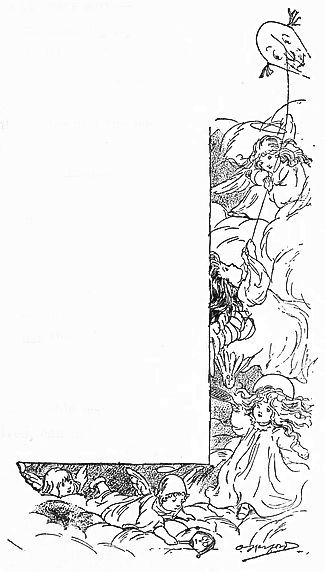
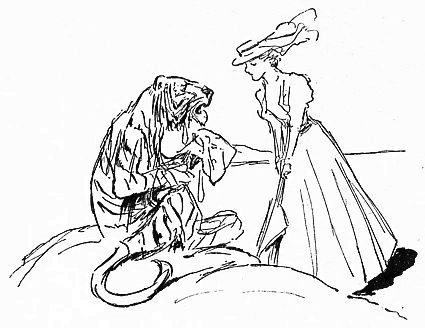
A lady on the lonely shore
Of a dull watering place
Once met a Tigress weeping sore,
Tears streaming down her face.
And knowing well that safety lay
In not betraying fear,
She asked in quite a friendly way,
“What makes you weep, my dear?”
[113]The Tigress brushed a tear aside;
“I want a man!” she wailed.
“A man! they’re scarce!” the lady cried;
“I fear the crop has failed!
There is but one in miles, and oh,
I fear that he is wed!”
The Tigress smiled. “I am, you know,
A man eater,” she said.
“You eat them!” cried the maid, then ceased
In horror and amaze,
Then sat her down to show the beast
The error of her ways.
“Men are so scarce,” she urged, “I fear
There are n’t enough to go
Around—now is it right, my dear,
That you should waste them so?
I weep to think of all the men
You’ve spoiled ere now,” said she.
“And if you eat the rest, why, then
What will be left for me?”
[114]The hours flew by; she took no rest
Till twilight, when at last
The contrite beast with sobs confessed
Repentance for the past.
“Go,” said the maid, “take my advice;
I know what’s best for you;
It’s cheap and filling at the price;
Go seek the oyster stew!”
The Tigress lies unto this day
Upon an oyster bed.
The Lady—so the gossips say—
Is shortly to be wed.
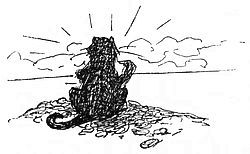
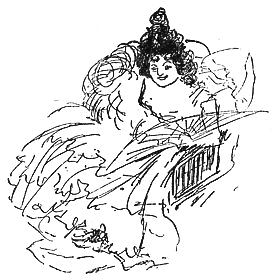
TO C. D. G. AND A. B. W.
Two ladies, not real ladies (no offence—
I don’t mean “not real ladies” in that sense),
But pictured fancies they—who dwelt between
The pages of a weekly magazine.
Though often in the selfsame week they met,
They were n’t exactly in the selfsame set,
And could not know each other. One, I think,
Was done in wash; the other, pen and ink.
The wash lady (again there’s no offence—
I use “wash” in its pure artistic sense)
Was a brunette, vivacious, charming wholly;
Neither too slim, nor yet too rolly-poly.
[116]A dazzling smile had this enchanting creature;
Indeed, her most predominating feature
Was a continuous show of glittering pearl;
And on her forehead hung a little curl—
A most distracting little curl; and last,
She had a very slight Hebraic cast.
Gray eyes the other had, serene and clear;
A cold and distant manner; yet I fear
Her looks belied her, for she oft was seen
Lounging about the beach, or ’mid the green,
Of the conservatory’s dim retreat,
Always some chappie nestling at her feet.
A first-rate fellow she, and looked her best
When in a golf or walking costume dressed;
In short, the other’s opposite in all,
And fearfully and wonderfully tall.
One day, by chance, each occupied a place
On the same page, exactly face to face,
In such a way ’t was possible no more
For either one the other to ignore.
Then in an instant burst into a flame
The fire that had been smouldering.
“How came
You here?” they both exclaimed, as with one voice.
(Here I use asterisks, though not from choice
[117]But type has limits, and must play the dunce;
When two young ladies both converse at once.)
**—!—***?**!!!!!!*****!!***??——
—!!*********!!-----!——!-----***
***—!!!!!——!—!—!!
I left them to their scenes.
Next day I found the page in smithereens,
And I reflected, “It is very sad
That two nice girls should get so awfully mad
About a thing for which, had they but known,
Two artists were responsible alone.”

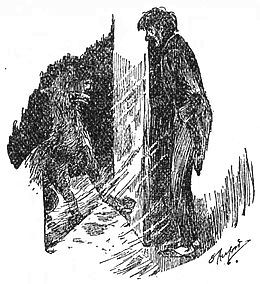
O Wolf, I do not dread thee as of yore,
Time was when I would tremble in my shoes
At sight of thee—when lo! my pity’ng Muse
Brought me wherewith to drive thee from the door.
And since at last, O Wolf, my waning store
Has lured thee back, she will not now refuse
My invocation. So I cannot choose
But cry, “Help! Wolf!” that she may come once more.
Mine is a Muse that listens with disdain
To any call save that of appetite;
And till thou earnest all my prayers were vain,
For while my purse was full, my brain was light.
Therefore, O Wolf, I welcome thee again
To speed the Muse—that I may dine to-night.
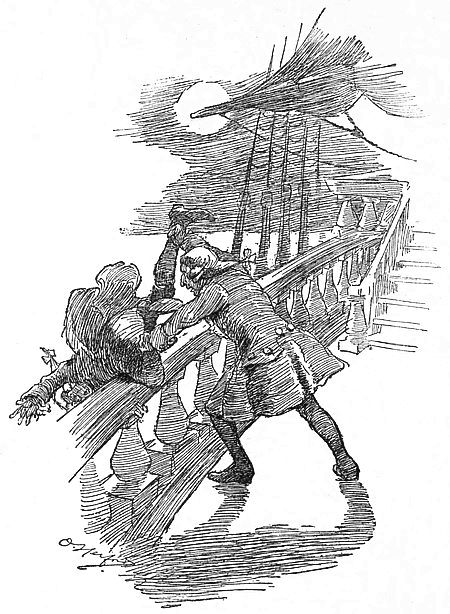
A GHOST STORY.
In all the Eastern hemisphere
You would n’t find a knight, a peer,
A viscount, earl or baronet,
A marquis or a duke, nor yet
A prince, or emperor, or king,
Or sultan, czar, or anything
That could in family pride surpass
J. Wentworth Beane of Boston, Mass.
His family tree could far outscale
The bean-stalk in the fairy tale;
And Joseph’s coat would pale before
The blazon’d coat-of-arms he bore,
The arms of his old ancestor,
One Godfrey Beane, “who crossed, you know,
About two hundred years ago.”
He had it stamped, engraved, embossed,
Without the least regard to cost,
Upon his house, upon his gate,
Upon his table-cloth, his plate,
[122]Upon his knocker, and his mat,
Upon his watch, inside his hat;
On scarf-pin, handkerchief, and screen,
And cards; in short, J. Wentworth Beane
Contrived to have old Godfrey’s crest
On everything that he possessed.
And lastly, when he died, his will
Proved to contain a codicil
Directing that a sum be spent
To carve it on his monument.
But if you think this ends the scene
You little know J. Wentworth Beane.
To judge him by the common host
Is reckoning without his ghost.
And it is something that befell
His ghost I chiefly have to tell.
At midnight of the very day
They laid J. Wentworth Beane away,
No sooner had the clock come round
To 12 P. M. than from the ground
Arose a spectre, lank and lean,
With frigid air and haughty mien;
No other than J. Wentworth Beane,
Unchanged in all, except his pride—
If anything, intensified.
[123]He looked about him with that air
Of supercilious despair
That very stuck-up people wear
At some society affair
When no one in their set is there.
Then, after brushing from his sleeves
Some bits of mould and clinging leaves,
And lightly dusting off his shoe,
The iron gate he floated through,
Just looking back the clock to note,
As one who fears to miss a boat.
Ten minutes later found him on
The ghost’s Cunarder—“Oregon;”
And ten days later by spook time
He heard the hour of midnight chime
From out the tower of Beanley Hall,
And stood within the grave-yard wall
Beside a stone, moss-grown and green,
On which these simple words were seen:
In Memory
Sir Godfrey Beane.
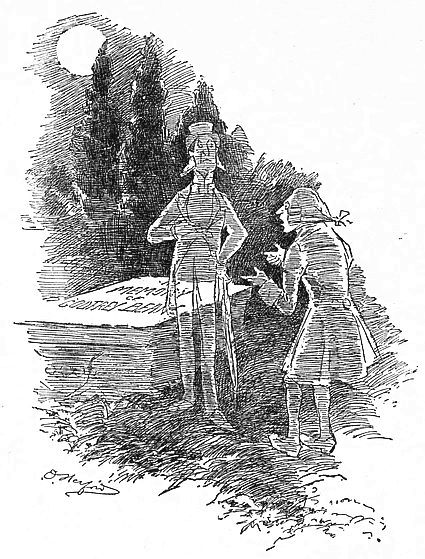
The while he gazed in thought serene
A little ghost of humble mien,
Unkempt and crooked, bent and spare,
Accosted him with cringing air:
[125]“Most noble sir, ’t is plain to see
You are not of the likes of me;
You are a spook of high degree.”
“My good man,” cried J. Wentworth B.,
“Leave me a little while, I pray,
I’ve travelled very far to-day,
And I desire to be alone
With him who sleeps beneath this stone.
I cannot rest till I have seen
My ancestor, Sir Godfrey Beane.”
“Your ancestor! How can that be?”
Exclaimed the little ghost, “when he,
Last of his line, was drowned at sea
Two hundred years ago; this stone
Is to his memory alone.
I, and I only, saw his end.
As he, my master and my friend,
Leaned o’er the vessel’s side one night
I pushed him—no, it was not right,
I own that I was much to blame;
I donned his clothes, and took the name
Of Beane—I also took his gold,
About five thousand pounds all told;
And so to Boston, Mass., I came
To found a family and name—
[126]I, who in former times had been
Sir Godfrey’s—”
“Wretch, what do you mean!
Sir Godfrey’s what?” gasped Wentworth Beane.
“Sir Godfrey’s valet!”
That same night,
When the ghost steamer sailed, you might
Among the passengers have seen
A ghost of very abject mien,
Faded and shrunk, forlorn and frayed,
The shadow of his former shade,
Who registered in steerage class,
J. W. Beane of Boston, Mass.
Now, gentle reader, do not try
To guess the family which I
Disguise as Beane—enough that they
Exist on Beacon Hill to-day,
In sweet enjoyment of their claims—
It is not well to mention names.
End of Project Gutenberg's The Bashful Earthquake, by Oliver Herford
*** END OF THIS PROJECT GUTENBERG EBOOK THE BASHFUL EARTHQUAKE ***
***** This file should be named 56765-h.htm or 56765-h.zip *****
This and all associated files of various formats will be found in:
http://www.gutenberg.org/5/6/7/6/56765/
Produced by David Edwards, John Campbell and the Online
Distributed Proofreading Team at http://www.pgdp.net (This
book was produced from scanned images of public domain
material from the Google Books project.)
Updated editions will replace the previous one--the old editions
will be renamed.
Creating the works from public domain print editions means that no
one owns a United States copyright in these works, so the Foundation
(and you!) can copy and distribute it in the United States without
permission and without paying copyright royalties. Special rules,
set forth in the General Terms of Use part of this license, apply to
copying and distributing Project Gutenberg-tm electronic works to
protect the PROJECT GUTENBERG-tm concept and trademark. Project
Gutenberg is a registered trademark, and may not be used if you
charge for the eBooks, unless you receive specific permission. If you
do not charge anything for copies of this eBook, complying with the
rules is very easy. You may use this eBook for nearly any purpose
such as creation of derivative works, reports, performances and
research. They may be modified and printed and given away--you may do
practically ANYTHING with public domain eBooks. Redistribution is
subject to the trademark license, especially commercial
redistribution.
*** START: FULL LICENSE ***
THE FULL PROJECT GUTENBERG LICENSE
PLEASE READ THIS BEFORE YOU DISTRIBUTE OR USE THIS WORK
To protect the Project Gutenberg-tm mission of promoting the free
distribution of electronic works, by using or distributing this work
(or any other work associated in any way with the phrase "Project
Gutenberg"), you agree to comply with all the terms of the Full Project
Gutenberg-tm License (available with this file or online at
http://gutenberg.org/license).
Section 1. General Terms of Use and Redistributing Project Gutenberg-tm
electronic works
1.A. By reading or using any part of this Project Gutenberg-tm
electronic work, you indicate that you have read, understand, agree to
and accept all the terms of this license and intellectual property
(trademark/copyright) agreement. If you do not agree to abide by all
the terms of this agreement, you must cease using and return or destroy
all copies of Project Gutenberg-tm electronic works in your possession.
If you paid a fee for obtaining a copy of or access to a Project
Gutenberg-tm electronic work and you do not agree to be bound by the
terms of this agreement, you may obtain a refund from the person or
entity to whom you paid the fee as set forth in paragraph 1.E.8.
1.B. "Project Gutenberg" is a registered trademark. It may only be
used on or associated in any way with an electronic work by people who
agree to be bound by the terms of this agreement. There are a few
things that you can do with most Project Gutenberg-tm electronic works
even without complying with the full terms of this agreement. See
paragraph 1.C below. There are a lot of things you can do with Project
Gutenberg-tm electronic works if you follow the terms of this agreement
and help preserve free future access to Project Gutenberg-tm electronic
works. See paragraph 1.E below.
1.C. The Project Gutenberg Literary Archive Foundation ("the Foundation"
or PGLAF), owns a compilation copyright in the collection of Project
Gutenberg-tm electronic works. Nearly all the individual works in the
collection are in the public domain in the United States. If an
individual work is in the public domain in the United States and you are
located in the United States, we do not claim a right to prevent you from
copying, distributing, performing, displaying or creating derivative
works based on the work as long as all references to Project Gutenberg
are removed. Of course, we hope that you will support the Project
Gutenberg-tm mission of promoting free access to electronic works by
freely sharing Project Gutenberg-tm works in compliance with the terms of
this agreement for keeping the Project Gutenberg-tm name associated with
the work. You can easily comply with the terms of this agreement by
keeping this work in the same format with its attached full Project
Gutenberg-tm License when you share it without charge with others.
1.D. The copyright laws of the place where you are located also govern
what you can do with this work. Copyright laws in most countries are in
a constant state of change. If you are outside the United States, check
the laws of your country in addition to the terms of this agreement
before downloading, copying, displaying, performing, distributing or
creating derivative works based on this work or any other Project
Gutenberg-tm work. The Foundation makes no representations concerning
the copyright status of any work in any country outside the United
States.
1.E. Unless you have removed all references to Project Gutenberg:
1.E.1. The following sentence, with active links to, or other immediate
access to, the full Project Gutenberg-tm License must appear prominently
whenever any copy of a Project Gutenberg-tm work (any work on which the
phrase "Project Gutenberg" appears, or with which the phrase "Project
Gutenberg" is associated) is accessed, displayed, performed, viewed,
copied or distributed:
This eBook is for the use of anyone anywhere at no cost and with
almost no restrictions whatsoever. You may copy it, give it away or
re-use it under the terms of the Project Gutenberg License included
with this eBook or online at www.gutenberg.org/license
1.E.2. If an individual Project Gutenberg-tm electronic work is derived
from the public domain (does not contain a notice indicating that it is
posted with permission of the copyright holder), the work can be copied
and distributed to anyone in the United States without paying any fees
or charges. If you are redistributing or providing access to a work
with the phrase "Project Gutenberg" associated with or appearing on the
work, you must comply either with the requirements of paragraphs 1.E.1
through 1.E.7 or obtain permission for the use of the work and the
Project Gutenberg-tm trademark as set forth in paragraphs 1.E.8 or
1.E.9.
1.E.3. If an individual Project Gutenberg-tm electronic work is posted
with the permission of the copyright holder, your use and distribution
must comply with both paragraphs 1.E.1 through 1.E.7 and any additional
terms imposed by the copyright holder. Additional terms will be linked
to the Project Gutenberg-tm License for all works posted with the
permission of the copyright holder found at the beginning of this work.
1.E.4. Do not unlink or detach or remove the full Project Gutenberg-tm
License terms from this work, or any files containing a part of this
work or any other work associated with Project Gutenberg-tm.
1.E.5. Do not copy, display, perform, distribute or redistribute this
electronic work, or any part of this electronic work, without
prominently displaying the sentence set forth in paragraph 1.E.1 with
active links or immediate access to the full terms of the Project
Gutenberg-tm License.
1.E.6. You may convert to and distribute this work in any binary,
compressed, marked up, nonproprietary or proprietary form, including any
word processing or hypertext form. However, if you provide access to or
distribute copies of a Project Gutenberg-tm work in a format other than
"Plain Vanilla ASCII" or other format used in the official version
posted on the official Project Gutenberg-tm web site (www.gutenberg.org),
you must, at no additional cost, fee or expense to the user, provide a
copy, a means of exporting a copy, or a means of obtaining a copy upon
request, of the work in its original "Plain Vanilla ASCII" or other
form. Any alternate format must include the full Project Gutenberg-tm
License as specified in paragraph 1.E.1.
1.E.7. Do not charge a fee for access to, viewing, displaying,
performing, copying or distributing any Project Gutenberg-tm works
unless you comply with paragraph 1.E.8 or 1.E.9.
1.E.8. You may charge a reasonable fee for copies of or providing
access to or distributing Project Gutenberg-tm electronic works provided
that
- You pay a royalty fee of 20% of the gross profits you derive from
the use of Project Gutenberg-tm works calculated using the method
you already use to calculate your applicable taxes. The fee is
owed to the owner of the Project Gutenberg-tm trademark, but he
has agreed to donate royalties under this paragraph to the
Project Gutenberg Literary Archive Foundation. Royalty payments
must be paid within 60 days following each date on which you
prepare (or are legally required to prepare) your periodic tax
returns. Royalty payments should be clearly marked as such and
sent to the Project Gutenberg Literary Archive Foundation at the
address specified in Section 4, "Information about donations to
the Project Gutenberg Literary Archive Foundation."
- You provide a full refund of any money paid by a user who notifies
you in writing (or by e-mail) within 30 days of receipt that s/he
does not agree to the terms of the full Project Gutenberg-tm
License. You must require such a user to return or
destroy all copies of the works possessed in a physical medium
and discontinue all use of and all access to other copies of
Project Gutenberg-tm works.
- You provide, in accordance with paragraph 1.F.3, a full refund of any
money paid for a work or a replacement copy, if a defect in the
electronic work is discovered and reported to you within 90 days
of receipt of the work.
- You comply with all other terms of this agreement for free
distribution of Project Gutenberg-tm works.
1.E.9. If you wish to charge a fee or distribute a Project Gutenberg-tm
electronic work or group of works on different terms than are set
forth in this agreement, you must obtain permission in writing from
both the Project Gutenberg Literary Archive Foundation and Michael
Hart, the owner of the Project Gutenberg-tm trademark. Contact the
Foundation as set forth in Section 3 below.
1.F.
1.F.1. Project Gutenberg volunteers and employees expend considerable
effort to identify, do copyright research on, transcribe and proofread
public domain works in creating the Project Gutenberg-tm
collection. Despite these efforts, Project Gutenberg-tm electronic
works, and the medium on which they may be stored, may contain
"Defects," such as, but not limited to, incomplete, inaccurate or
corrupt data, transcription errors, a copyright or other intellectual
property infringement, a defective or damaged disk or other medium, a
computer virus, or computer codes that damage or cannot be read by
your equipment.
1.F.2. LIMITED WARRANTY, DISCLAIMER OF DAMAGES - Except for the "Right
of Replacement or Refund" described in paragraph 1.F.3, the Project
Gutenberg Literary Archive Foundation, the owner of the Project
Gutenberg-tm trademark, and any other party distributing a Project
Gutenberg-tm electronic work under this agreement, disclaim all
liability to you for damages, costs and expenses, including legal
fees. YOU AGREE THAT YOU HAVE NO REMEDIES FOR NEGLIGENCE, STRICT
LIABILITY, BREACH OF WARRANTY OR BREACH OF CONTRACT EXCEPT THOSE
PROVIDED IN PARAGRAPH 1.F.3. YOU AGREE THAT THE FOUNDATION, THE
TRADEMARK OWNER, AND ANY DISTRIBUTOR UNDER THIS AGREEMENT WILL NOT BE
LIABLE TO YOU FOR ACTUAL, DIRECT, INDIRECT, CONSEQUENTIAL, PUNITIVE OR
INCIDENTAL DAMAGES EVEN IF YOU GIVE NOTICE OF THE POSSIBILITY OF SUCH
DAMAGE.
1.F.3. LIMITED RIGHT OF REPLACEMENT OR REFUND - If you discover a
defect in this electronic work within 90 days of receiving it, you can
receive a refund of the money (if any) you paid for it by sending a
written explanation to the person you received the work from. If you
received the work on a physical medium, you must return the medium with
your written explanation. The person or entity that provided you with
the defective work may elect to provide a replacement copy in lieu of a
refund. If you received the work electronically, the person or entity
providing it to you may choose to give you a second opportunity to
receive the work electronically in lieu of a refund. If the second copy
is also defective, you may demand a refund in writing without further
opportunities to fix the problem.
1.F.4. Except for the limited right of replacement or refund set forth
in paragraph 1.F.3, this work is provided to you 'AS-IS' WITH NO OTHER
WARRANTIES OF ANY KIND, EXPRESS OR IMPLIED, INCLUDING BUT NOT LIMITED TO
WARRANTIES OF MERCHANTABILITY OR FITNESS FOR ANY PURPOSE.
1.F.5. Some states do not allow disclaimers of certain implied
warranties or the exclusion or limitation of certain types of damages.
If any disclaimer or limitation set forth in this agreement violates the
law of the state applicable to this agreement, the agreement shall be
interpreted to make the maximum disclaimer or limitation permitted by
the applicable state law. The invalidity or unenforceability of any
provision of this agreement shall not void the remaining provisions.
1.F.6. INDEMNITY - You agree to indemnify and hold the Foundation, the
trademark owner, any agent or employee of the Foundation, anyone
providing copies of Project Gutenberg-tm electronic works in accordance
with this agreement, and any volunteers associated with the production,
promotion and distribution of Project Gutenberg-tm electronic works,
harmless from all liability, costs and expenses, including legal fees,
that arise directly or indirectly from any of the following which you do
or cause to occur: (a) distribution of this or any Project Gutenberg-tm
work, (b) alteration, modification, or additions or deletions to any
Project Gutenberg-tm work, and (c) any Defect you cause.
Section 2. Information about the Mission of Project Gutenberg-tm
Project Gutenberg-tm is synonymous with the free distribution of
electronic works in formats readable by the widest variety of computers
including obsolete, old, middle-aged and new computers. It exists
because of the efforts of hundreds of volunteers and donations from
people in all walks of life.
Volunteers and financial support to provide volunteers with the
assistance they need, are critical to reaching Project Gutenberg-tm's
goals and ensuring that the Project Gutenberg-tm collection will
remain freely available for generations to come. In 2001, the Project
Gutenberg Literary Archive Foundation was created to provide a secure
and permanent future for Project Gutenberg-tm and future generations.
To learn more about the Project Gutenberg Literary Archive Foundation
and how your efforts and donations can help, see Sections 3 and 4
and the Foundation web page at http://www.pglaf.org.
Section 3. Information about the Project Gutenberg Literary Archive
Foundation
The Project Gutenberg Literary Archive Foundation is a non profit
501(c)(3) educational corporation organized under the laws of the
state of Mississippi and granted tax exempt status by the Internal
Revenue Service. The Foundation's EIN or federal tax identification
number is 64-6221541. Its 501(c)(3) letter is posted at
http://pglaf.org/fundraising. Contributions to the Project Gutenberg
Literary Archive Foundation are tax deductible to the full extent
permitted by U.S. federal laws and your state's laws.
The Foundation's principal office is located at 4557 Melan Dr. S.
Fairbanks, AK, 99712., but its volunteers and employees are scattered
throughout numerous locations. Its business office is located at
809 North 1500 West, Salt Lake City, UT 84116, (801) 596-1887, email
business@pglaf.org. Email contact links and up to date contact
information can be found at the Foundation's web site and official
page at http://pglaf.org
For additional contact information:
Dr. Gregory B. Newby
Chief Executive and Director
gbnewby@pglaf.org
Section 4. Information about Donations to the Project Gutenberg
Literary Archive Foundation
Project Gutenberg-tm depends upon and cannot survive without wide
spread public support and donations to carry out its mission of
increasing the number of public domain and licensed works that can be
freely distributed in machine readable form accessible by the widest
array of equipment including outdated equipment. Many small donations
($1 to $5,000) are particularly important to maintaining tax exempt
status with the IRS.
The Foundation is committed to complying with the laws regulating
charities and charitable donations in all 50 states of the United
States. Compliance requirements are not uniform and it takes a
considerable effort, much paperwork and many fees to meet and keep up
with these requirements. We do not solicit donations in locations
where we have not received written confirmation of compliance. To
SEND DONATIONS or determine the status of compliance for any
particular state visit http://pglaf.org
While we cannot and do not solicit contributions from states where we
have not met the solicitation requirements, we know of no prohibition
against accepting unsolicited donations from donors in such states who
approach us with offers to donate.
International donations are gratefully accepted, but we cannot make
any statements concerning tax treatment of donations received from
outside the United States. U.S. laws alone swamp our small staff.
Please check the Project Gutenberg Web pages for current donation
methods and addresses. Donations are accepted in a number of other
ways including checks, online payments and credit card donations.
To donate, please visit: http://pglaf.org/donate
Section 5. General Information About Project Gutenberg-tm electronic
works.
Professor Michael S. Hart is the originator of the Project Gutenberg-tm
concept of a library of electronic works that could be freely shared
with anyone. For thirty years, he produced and distributed Project
Gutenberg-tm eBooks with only a loose network of volunteer support.
Project Gutenberg-tm eBooks are often created from several printed
editions, all of which are confirmed as Public Domain in the U.S.
unless a copyright notice is included. Thus, we do not necessarily
keep eBooks in compliance with any particular paper edition.
Most people start at our Web site which has the main PG search facility:
http://www.gutenberg.org
This Web site includes information about Project Gutenberg-tm,
including how to make donations to the Project Gutenberg Literary
Archive Foundation, how to help produce our new eBooks, and how to
subscribe to our email newsletter to hear about new eBooks.